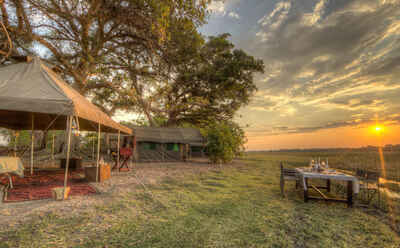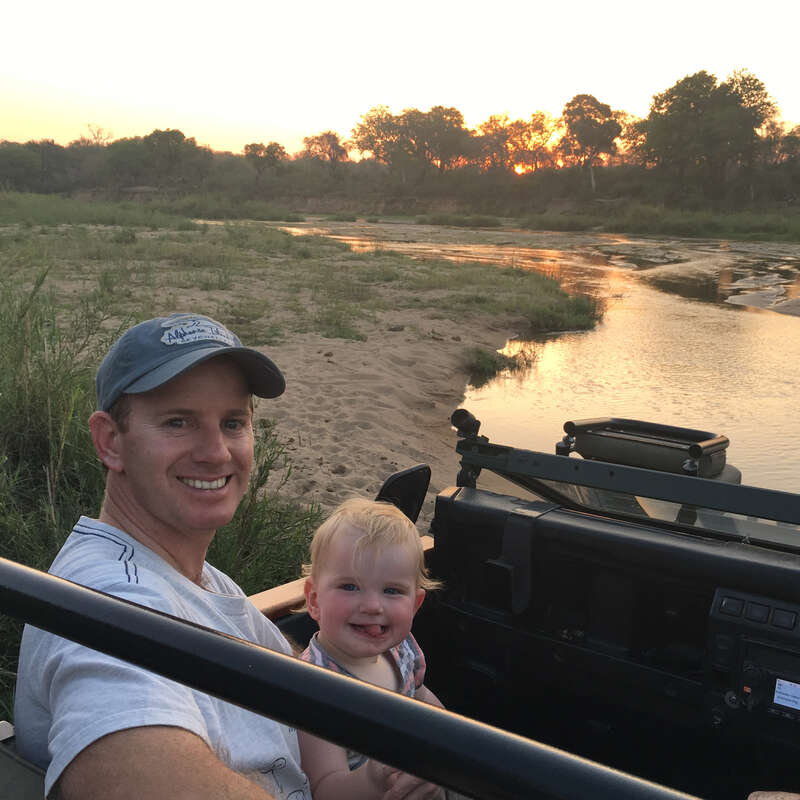About Okavango Delta Walking Safari
Many of Botswana’s safari camps offer morning walking safaris with the opportunity to learn about smaller ...
... creatures, markings and tracks from an expert guide. A select few safari camps focus exclusively on walking safaris, returning to a base camp after each morning and afternoon foray. The Okavango Delta Walking Safari is a multi-day walking trail in Botswana; and it includes one night fly-camping!
Unfortunately, the reserve where these walking safaris operated is no longer available to visitors. Please speak to us about other walking safari opportunities in Botswana.
Walking safaris offer a completely different experience to game drives, and remain the purest form of safari. A four-day trail such as this, led by an expert and informative guide, can be an unforgettable and rewarding experience. For a group of friends or a small family who enjoy nature, rate quality guiding and love a bit of adventure, this expedition is highly recommended.
Our view
Walking safaris offer a completely different experience to game drives, and remain the purest form of safari. A four-day trail such as this, led by an expert and informative guide, can be an unforgettable and rewarding experience. For a group of friends or a small family who enjoy nature, rate quality guiding and love a bit of adventure, this expedition is highly recommended.
Accommodation
4 Tents
Children
Best for aged 6+ years.
Open
All year
Activities

4WD Safari

Birdwatching

Boat trip

Fishing

Guided walking safari

Helicopter

Mokoro

Night drive

Private activities
Traveller reviews of Okavango Delta Walking Safari
1 real, un-edited reviews from Expert Africa's travellers.
Arrived 21 Oct 2015, 5 nights
"Botswana Private Mobile Safari review"
Overall rating: Excellent
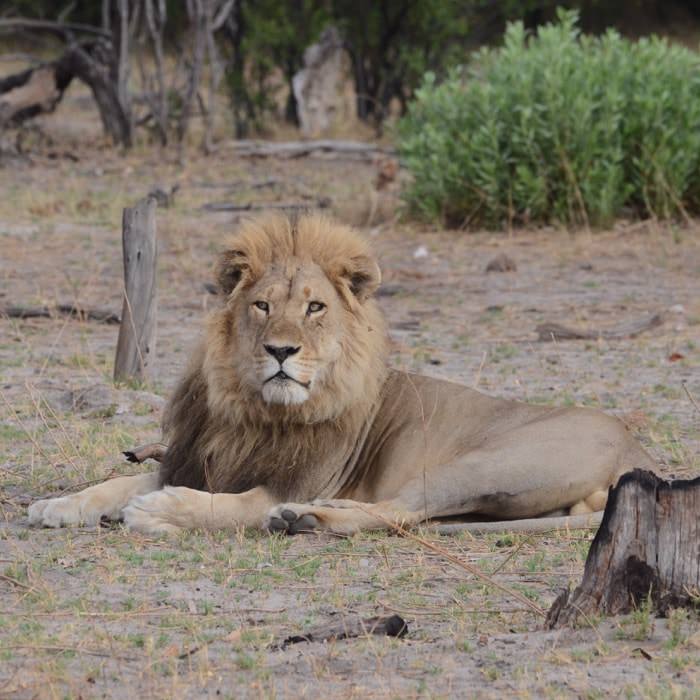
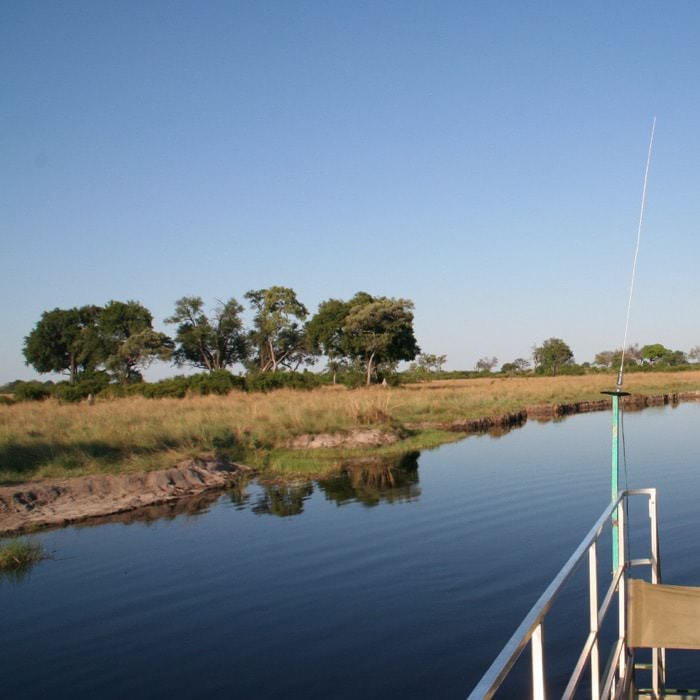
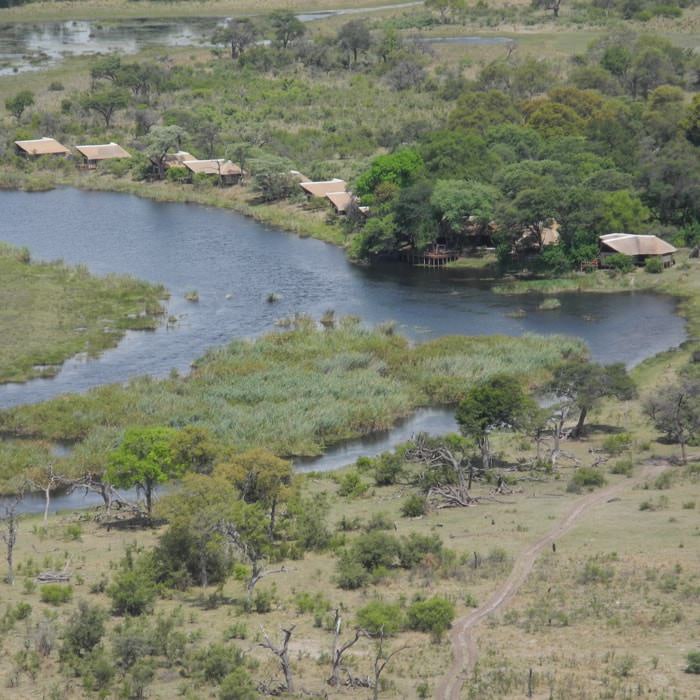
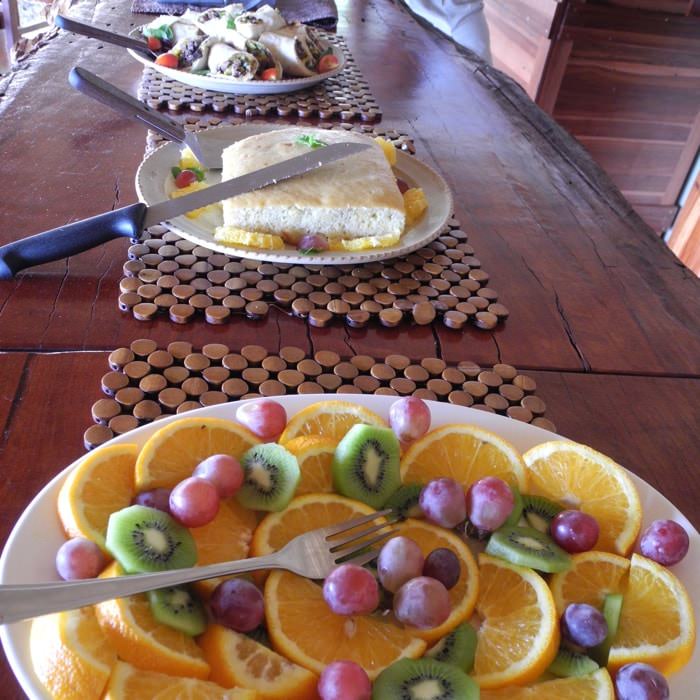
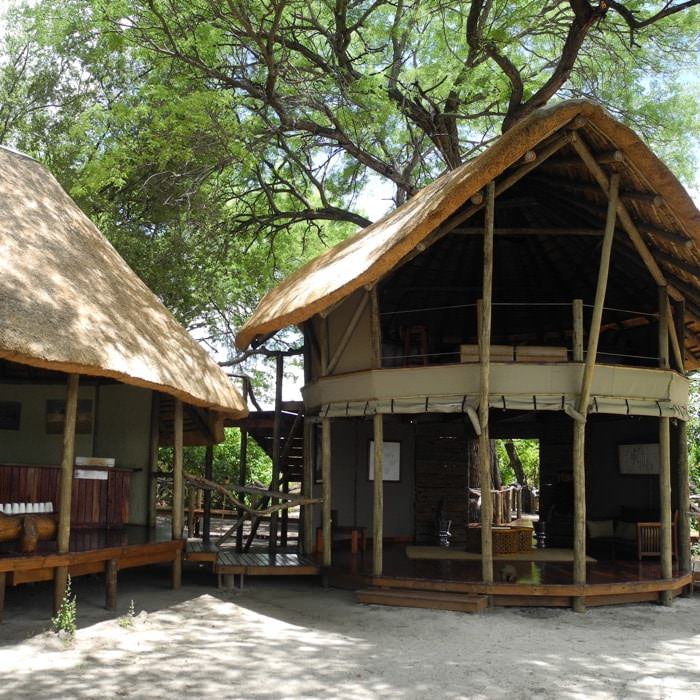
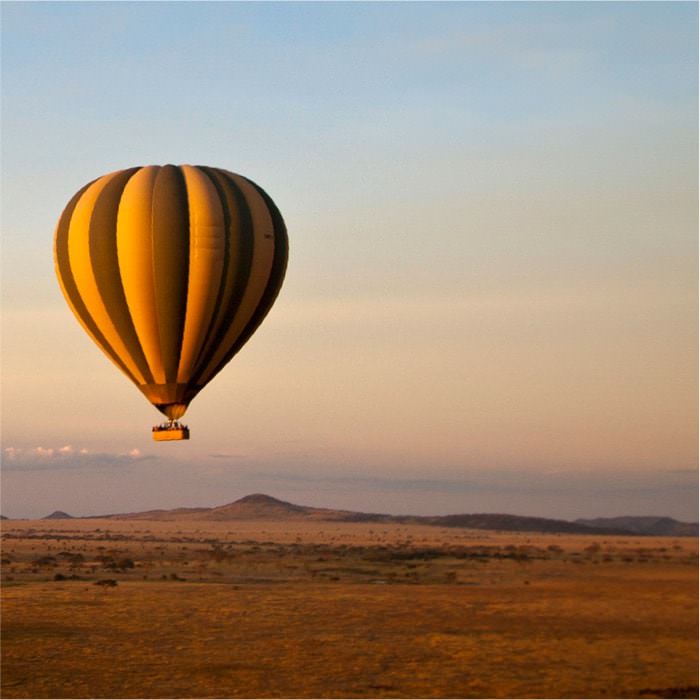
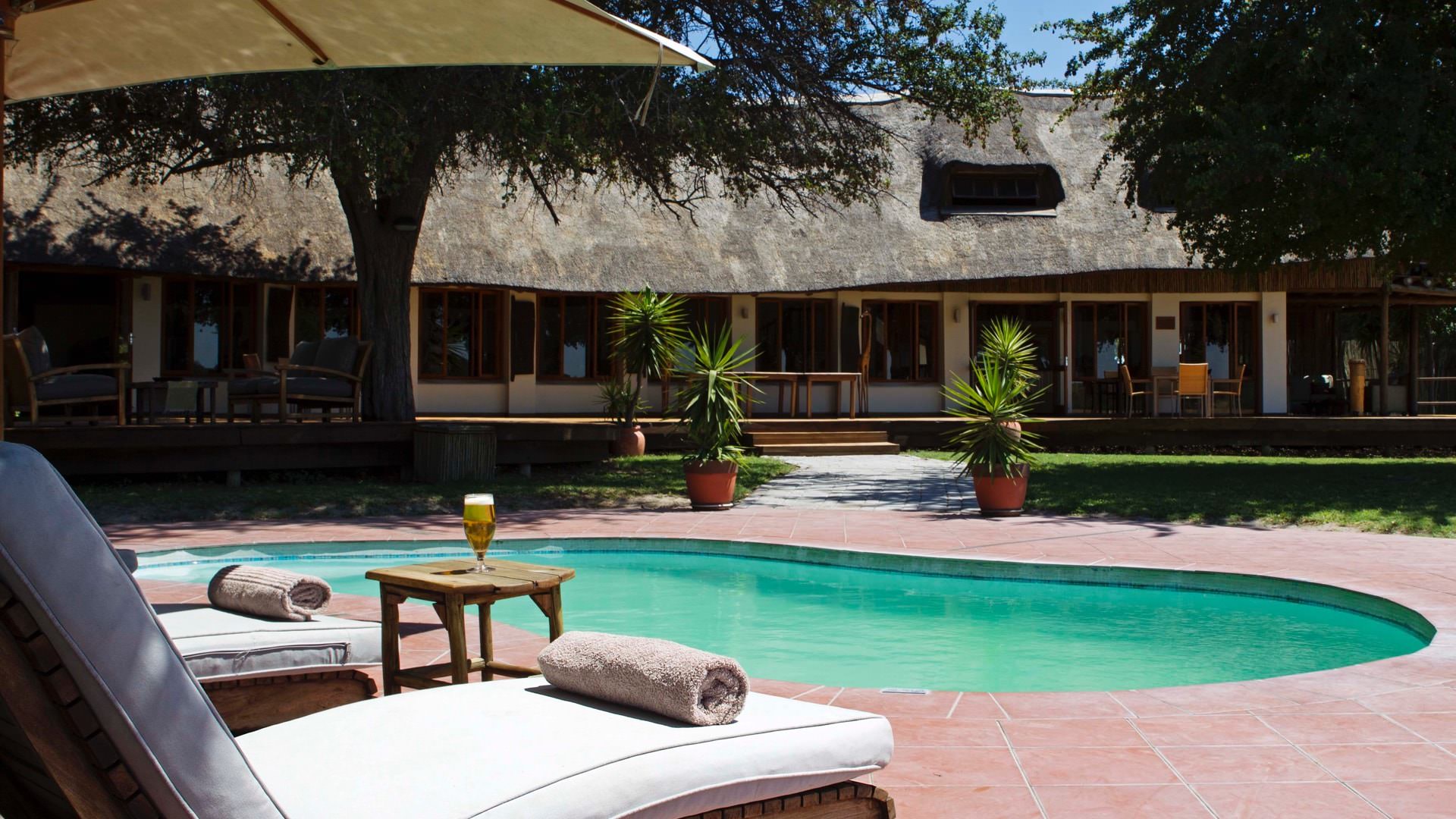
Expert Africa's gallery
When we travel we take lots of photos ourselves to give you a real and un-edited view of the safaris. See our 2 pictures of Okavango Walking Safari to get the candid view.
View galleryOkavango Delta Walking Safari: Our full report
Many of Botswana’s safari camps offer morning walking safaris with the opportunity to learn about smaller ...
... creatures, markings and tracks from an expert guide. A select few safari camps focus exclusively on walking safaris, returning to a base camp after each morning and afternoon foray. The Okavango Delta Walking Safari is a multi-day walking trail in Botswana; and it includes one night fly-camping!
Unfortunately, the reserve where these walking safaris operated is no longer available to visitors. Please speak to us about other walking safari opportunities in Botswana.
The Okavango Delta Walking Safari operates in a secluded corner of the Okavango Delta, where there are hardly any roads. Plains dotted with palm-covered islands, river systems that fill with water during the Delta flood and after good rains, and tranquil lagoons typify this quiet wilderness. Elephant, buffalo, giraffe and other plains game are common in the area, whilst lion and leopard are regularly seen, and wild dog occasionally pass through.
Led by an experienced and fully qualified, expert guide, and accompanied by a Bushman tracker, you'll explore this area on foot – interpreting the tracks, seeking the source of an early morning alarm call, discussing animal behavior, watching big game, and much more. Tranquil mokoro (dug-out canoe) excursions are also available if water levels allow.
Day one of this four-day walking expedition begins from Maun, where you are met by your guide and driven north in a safari vehicle through rural Botswana, passing villages and cattle posts, before reaching the veterinary cordon fence that separates wildlife from cattle. The drive from Maun to the vet fence lasts almost an hour. From this point onward, your game viewing experience begins. The remainder of your journey to the base camp will take approximately one hour, depending on what you spot along the way.
The camp team will have travelled ahead of you and have everything prepared at base camp for your arrival. If there's time, you can enjoy a short walk or mokoro excursion before taking sundowners overlooking a lagoon. Your guide explains the geology and history of the Okavango Delta to you before dinner and a good nights rest in a made-up bed in your comfortable en-suite tent.
Days two and three begin with early rises so you can walk in the cool of the morning. Fresh tracks and wildlife signs set the scene, and the direction, as you set out to follow the animals. During the heat of the day you stop for lunch in the shade of a giant ebony or sausage tree. There's then time for a siesta on bedrolls set up in the shade.
Set out again as the sun starts to cool. On day two you will arrive at your fly-camp by sunset, and on day three you will walk back to base camp. Your fly-camp consists of large mosquito nets surrounding your bedrolls (two bedrolls per net), set up around a campfire. A bush toilet and shower are erected nearby, dinner is a campfire barbeque, and one of the camp team remains awake throughout the night to watch for visitors.
Day four begins with a hearty breakfast and a short walk or mokoro excursion. You then game drive your way back to the vet fence and on to Maun in time for your homeward flight, or transfer on to a safari camp.
Alternatively, speak to us about extending your time with your expert guide, and joining him on a Botswana Private Mobile Safari. You could go on to stay in Moremi Game Reserve, Savuti Marsh, Chobe National Park or the Central Kalahari Game Reserve.
The Okavango Delta Walking Safari is priced to take a minimum of four people. It's perfect for a group of friends, relatives or a family. If you'd like to book as a couple, speak to us about joining an existing departure or about booking a private trip at a surcharge to the price. Families will receive a discounted rate for children under 12 years, and the itinerary will be adjusted to suit all ages in the group.
Activities
4WD Safari
Birdwatching
Boat trip
Fishing
Guided walking safari
Helicopter
Mokoro
Night drive
Private activities
Families & children
- Attitude towards children
- There is no minimum age limit on this safari, but we recommend it for children aged 6 or over due to the camp’s simplicity and remoteness. The Okavango Delta Walking Safari is an excellent choice for a family group with young children who are interested in nature.
- Equipment
- A triple tent is available for two adults with a young child. For families of four or more, parents must divide themselves to sleep one adult and one child per tent. For older children, a dome tent can be set up right next to the parent’s larger Meru tent.
- Generally recommended for children
- Recommended for children with a genuine interest in nature and the outdoors. The mobile camps are simple, with only the basic amenities, so there’s little else to capture their interest if they are not outdoorsy.
- Notes
- The mobile camps used on this safari are unfenced and dangerous wildlife does wander through. Because of this, children must remain under their parent's supervision at all times.
Food & drink
- Usual board basis
- Full Board & Activities
- Food quality
- An early and light breakfast of muffins, rusks, tea and coffee is usually offered before heading out on a walking safari. Brunch in camp or a bush lunch is served late morning and typically consists of fresh salads, baked breads and casserole dishes.
Around mid-afternoon, a high tea of freshly baked treats is served before you head out on a walk once again. After sundowner drinks and entrees around the campfire, a three-course dinner is served around at a dining table. When staying at a fly-camp, dinner takes the form of a barbeque. - Dining style
- Group Meals
- Dining locations
- Outdoor Dining
- Drinks included
- Drinks are included in the cost of the safari. As there is limited cold storage space you will be asked about your preferred beverages before you travel. Plenty of bottled water is available throughout.
Getting there
- Location
- Okavango Delta Safari Reserves, Botswana
- Ideal length of stay
- The Okavango Delta Walking Safari is a 4-day/3-night set trail. If you opt to extend your trip, and go on to camp in other locations on a mobile with your private guide, we recommend 2-3 nights in each additional location.
- Directions
- The walking reserve where the Okavango Delta Walking Safari operates is reached by road transfer from Maun. This takes about 2 hours by safari vehicle, partly through rural Botswana and partly through a wildlife area.
- Accessible by
- Fly-and-Transfer
Special interests
- Walking safaris
- The Okavango Delta Walking Safari is the only multi-day walking trail offered in Botswana. You’ll stay in a very comfortable mobile camp, with one night in a more adventurous fly-camp, in a secluded wilderness where there are few roads - led by a top expert guide and a Bushman.
- See ideas for Walking safaris in Botswana
Communications
- Power supply notes
- Recharging batteries is possible using solar power or the safari vehicle. We recommend you travel with an adaptor to a Botswana/South Africa plug point (220V), and that you carry a spare battery to use whilst the other is charging.
- Communications
- For all intents and purposes you should consider yourself out of contact whilst on a mobile safari in the bush. There is no mobile reception, no direct phone and no email. Your guide will carry a satellite phone to contact his office in Maun in the event of an emergency.
Health & safety
- Malarial protection recommended
- Yes
- Medical care
- Your expert walking guide is first-aid trained and will carry a first-aid kit with him. For more serious emergencies you would be evacuated by helicopter to Maun. Please note that it is only possible to fly out of camp during daylight hours as the bush airstrips do not have any lighting at night.
- Dangerous animals
- High Risk
- Security measures
- Your expert guide carries a rifle on all walking safaris.
- Fire safety
Useful info
- Disabled access
- Not Possible
- Laundry facilities
- Not included.
- Accepted payment on location
- Everything is included on the Okavango Delta Walking Safari, so apart from tips there is no requirement for money. If you would like to tip after the safari, it is best to do so in US dollars.
Plan and book your trip with Expert Africa
All of our trips are tailor-made, so we'll always adapt them to suit you. Talk to an Expert and let us plan and arrange your perfect trip.

Talk to an Expert
Call or email us now! We’ll match you with the Specialist in our team who is best suited to help you. Then together we can start planning your trip.

Set up your itinerary
Based on our experience and your ideas, your specialist will create a detailed, costed itinerary. We’ll refine it together, until we have a trip that you’re perfectly happy with.

Prepare for your trip
The same Specialist will make the seamless arrangements for your trip, send you detailed travel documents, and be available to answer any questions before you depart.

Travel with peace of mind
After you set off, you’ll be cared for by our partners in Africa, most of whom have worked with Expert Africa for decades. And if you ever need us urgently, we’re available 24/7.

When you return
We love to learn about your trip, and so will always be grateful if you’ve the time to give feedback to your Specialist when you return.
Okavango Delta Walking Safari's location
Look closer at the environment and surroundings of Okavango Walking Safari.
Excursions from Okavango Walking Safari
Optional extra day-trips and excursions possible whilst you're staying at Okavango Walking Safari. Talk to us: these are usually best arranged before you go.
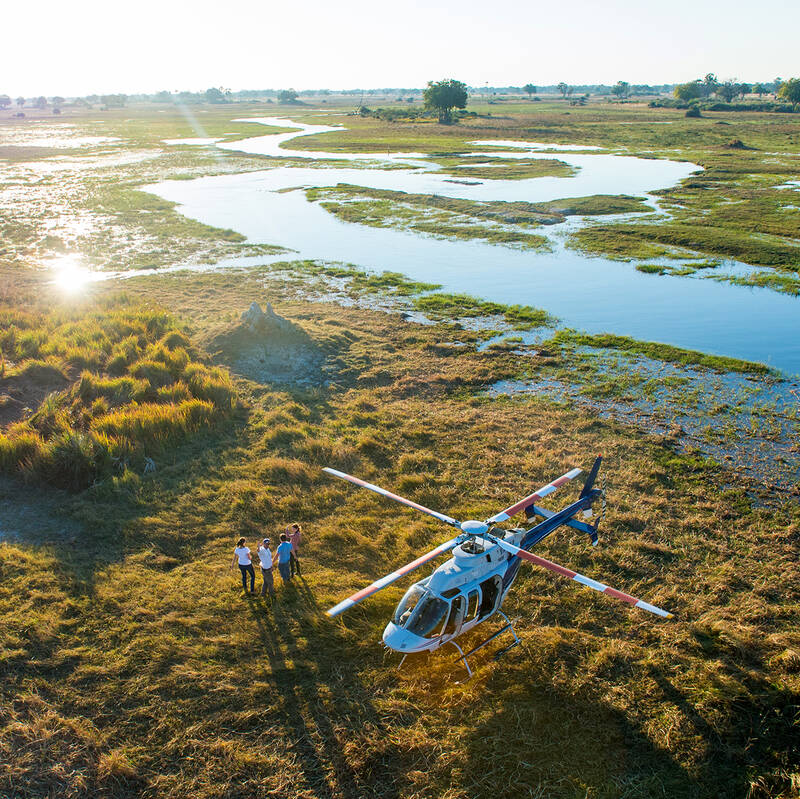
Helicopter Flight - Botswana
Various: from 30 minutes to half a day.
Low-flying, agile and offering superb views, helicopters are an ideal way to move around the Okavango Delta.You can use them instead of fixed-wing inter-lodge transfers or as an addition to other wildlife watching activities, and of course, helicopters can hover to allow that perfect pic, whereas fixed-wings can’t.
More about Helicopter FlightOther lodges in Okavango Delta Safari Reserves
Alternative places to stay in this same area.
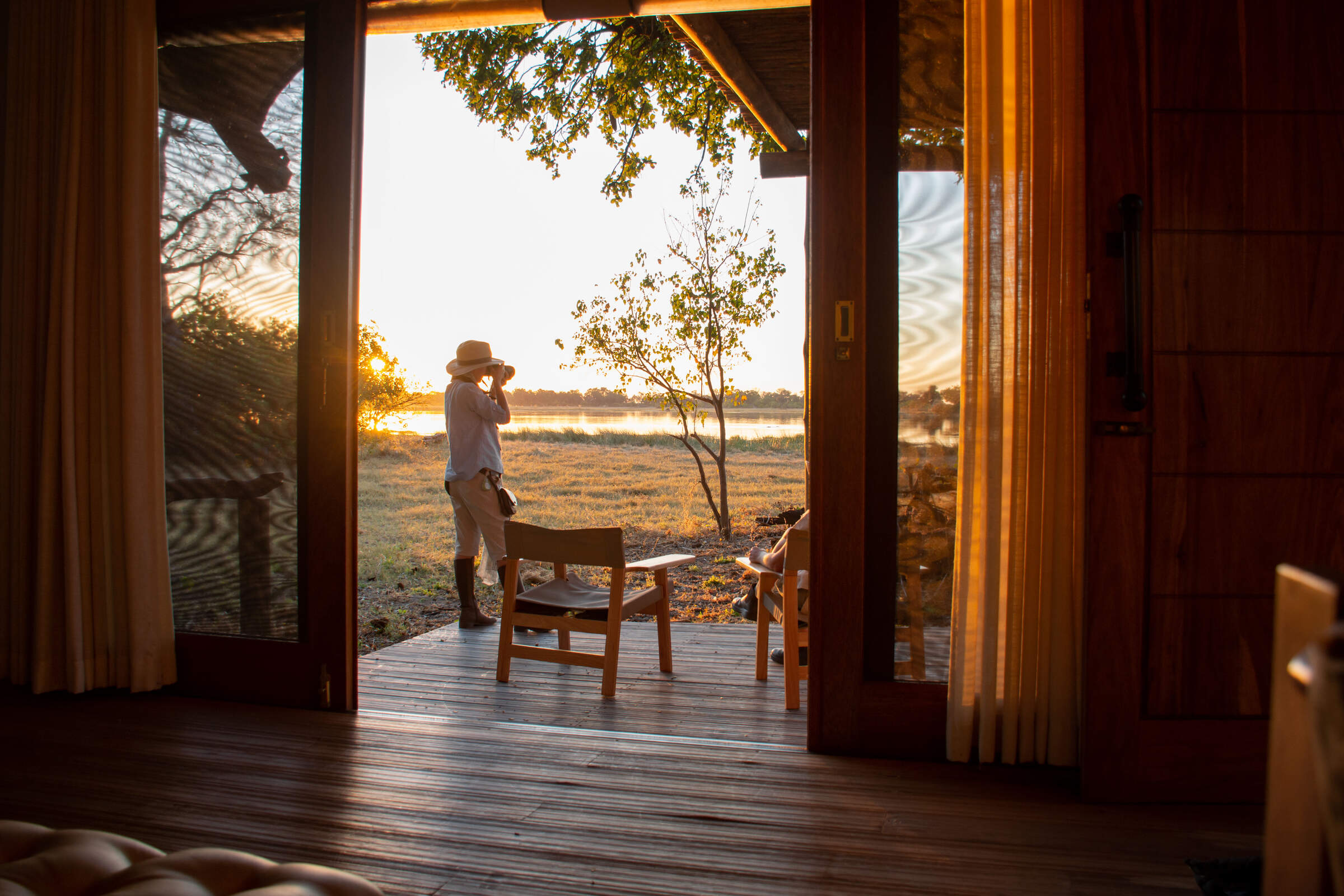
Kwara Camp
Kwara Camp's private reserve boasts land and water activities year-round, with excellent game-viewing opportunities and access to permanent channels of the north-east Okavango Delta.
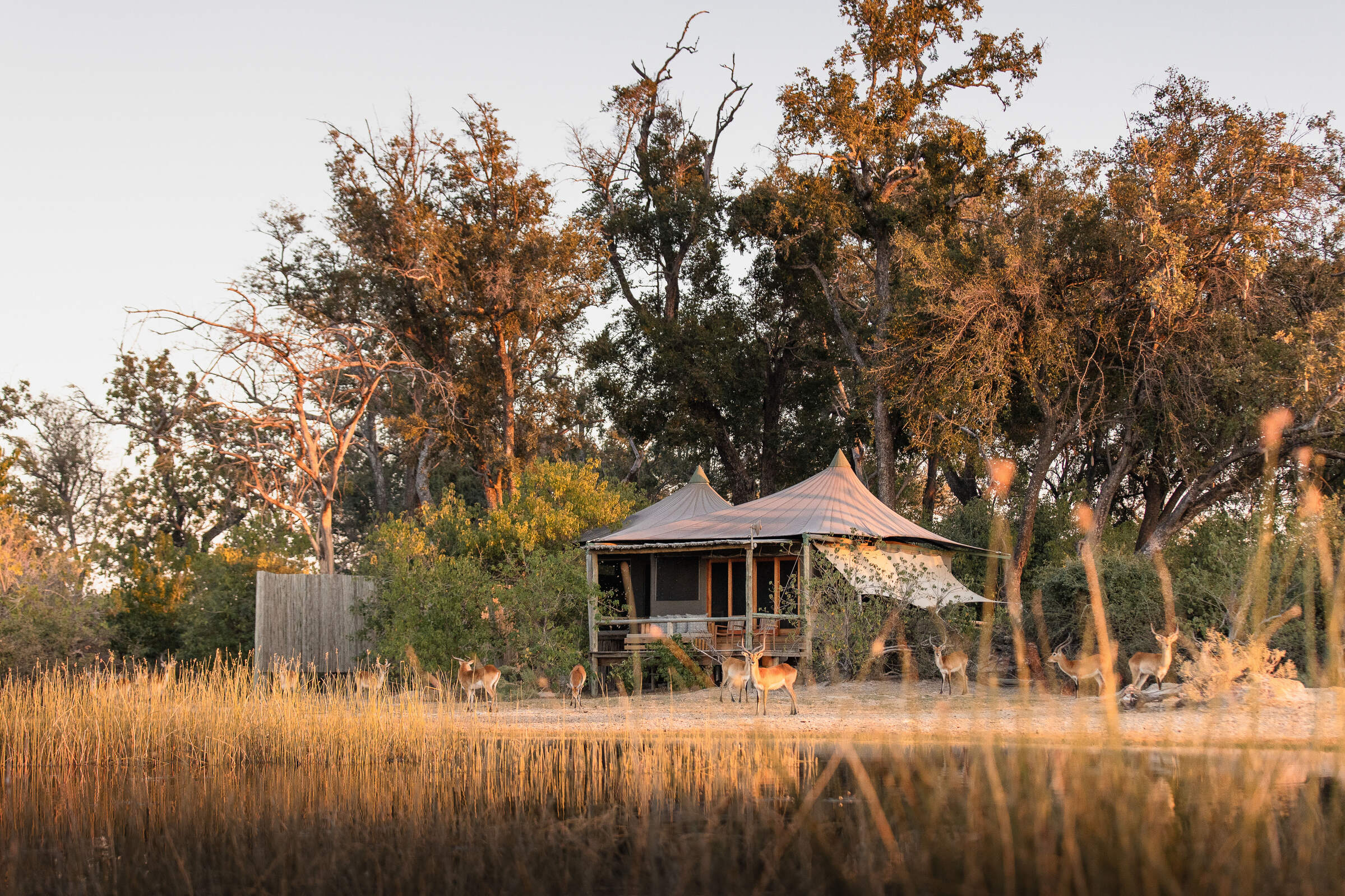
Little Vumbura
On a secluded island within a private reserve, Little Vumbura combines superb game viewing with a broad diversity of habitats in a truly picturesque setting.
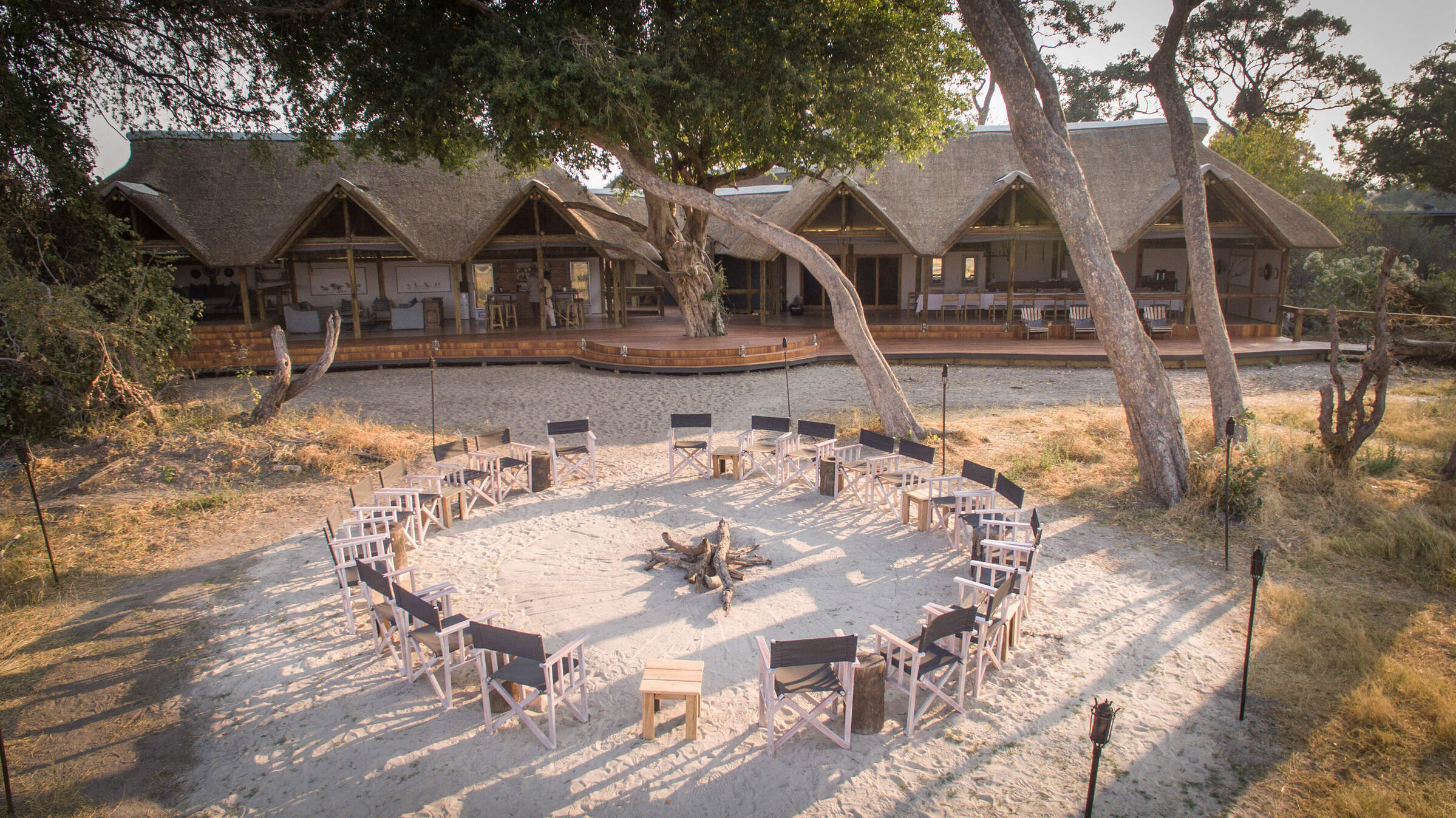
Splash Camp
Set in the Kwara Reserve, offering superb wildlife viewing year-round, Splash offers both land and water activities led by guides with a particular knack for tracking big game.
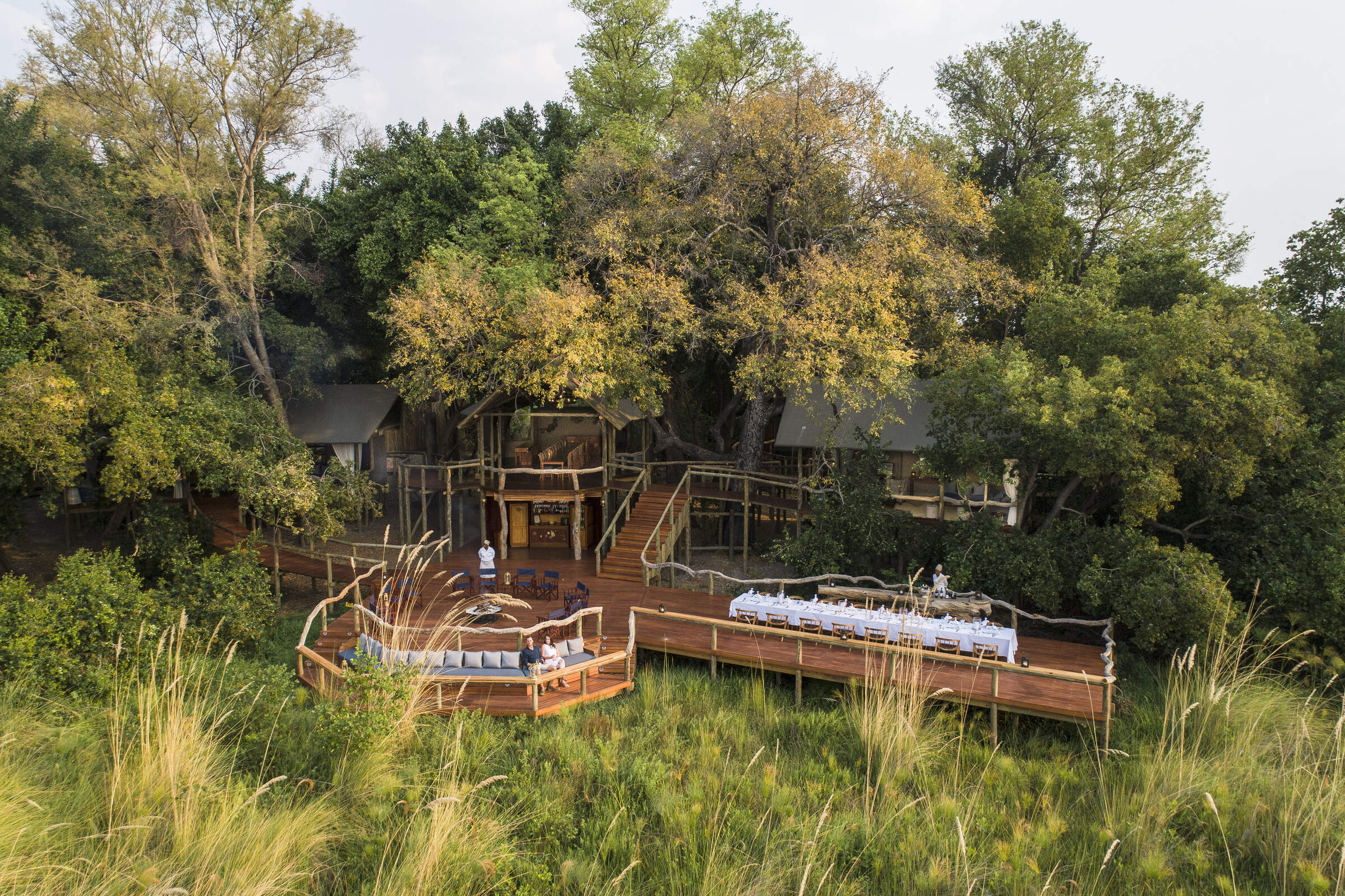
Shinde Camp
With experienced staff and a wealth of activities, Shinde offers a traditional safari in an exceptionally varied and wildlife-rich environment.
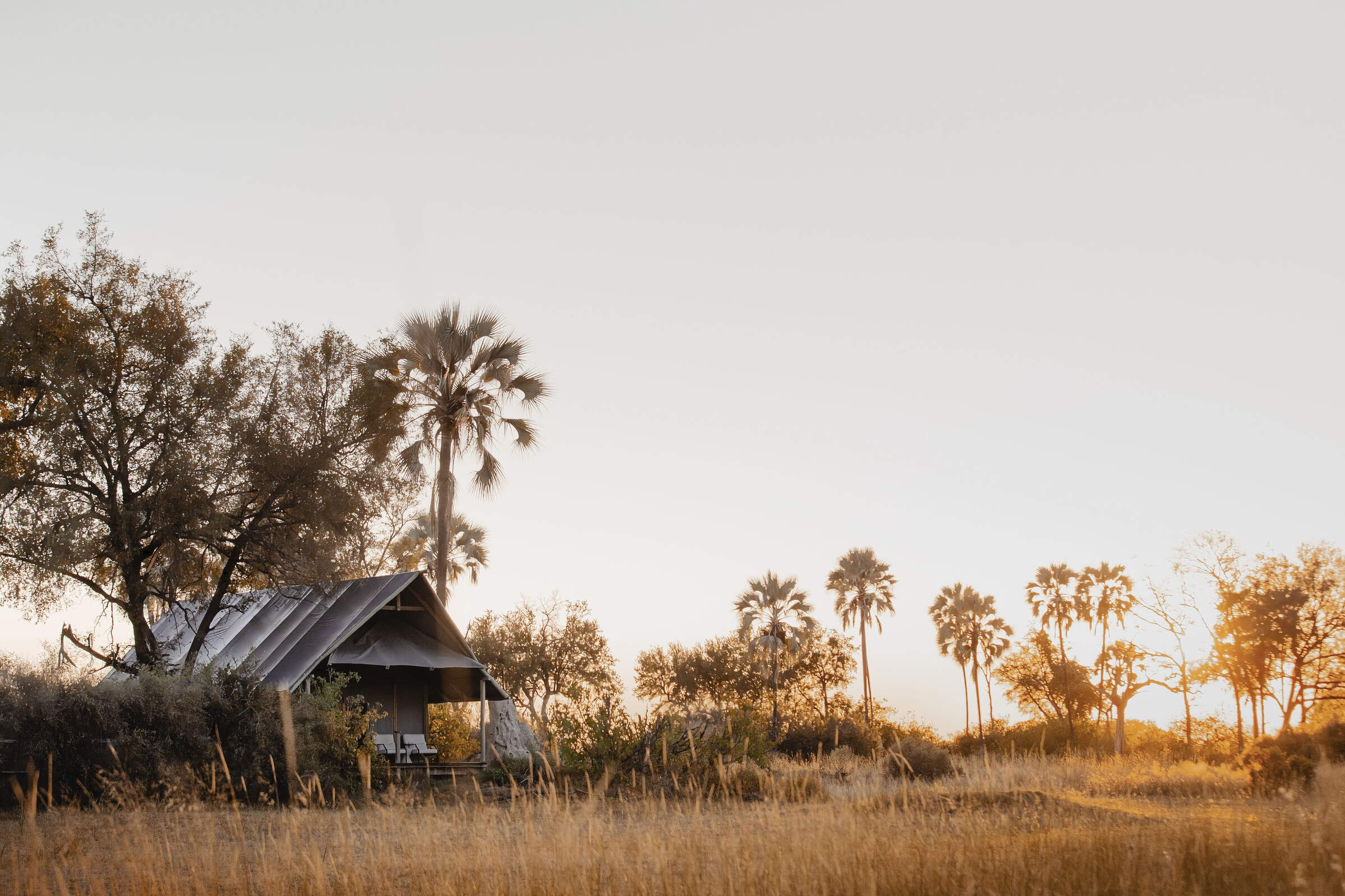
Chitabe Lediba
Chitabe Lediba, in Botswana's southern Okavango Delta, is a small family friendly safari camp; it offers great dry-land safaris and in our experience consistently delivers good game sightings.
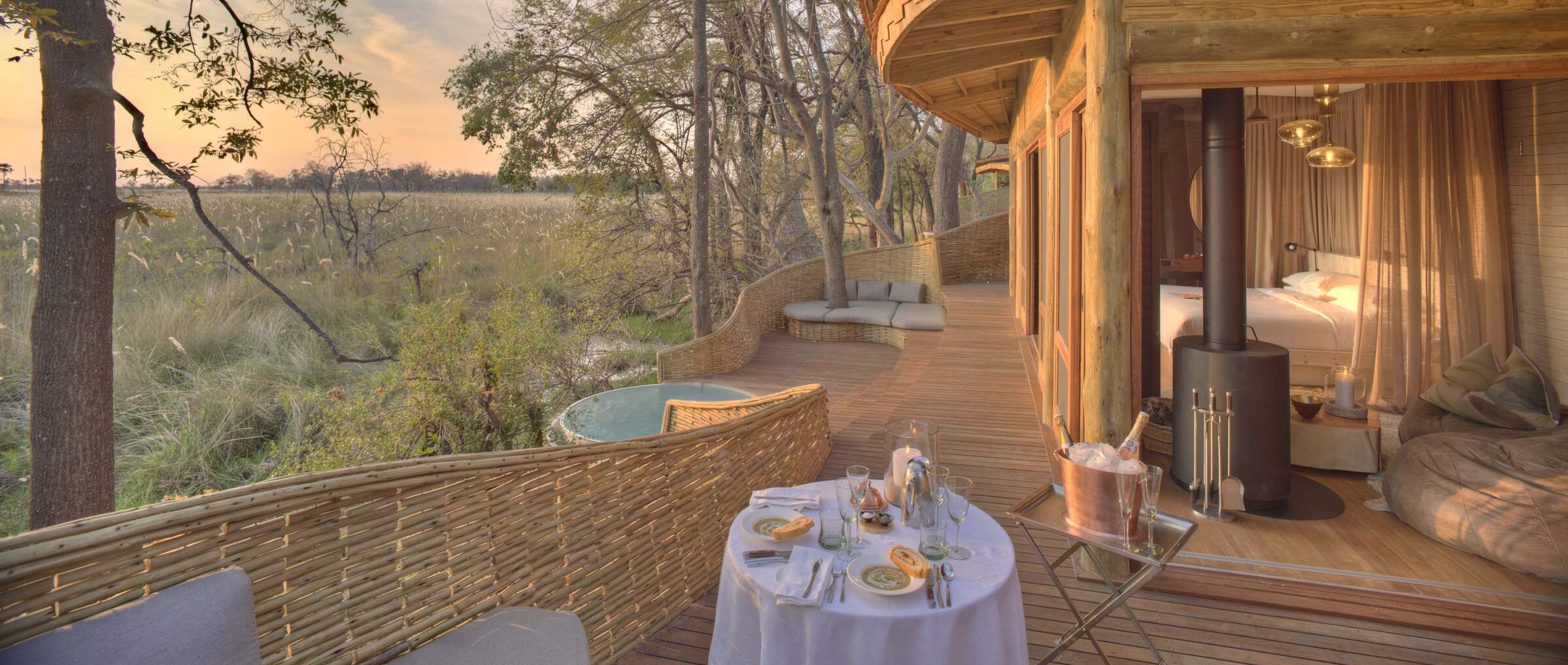
Sandibe Safari Lodge
The luxurious Sandibe Okavango Safari Lodge lies in a private concession in the heart of the Okavango Delta, beside Moremi Game Reserve, with superb big-game viewing.
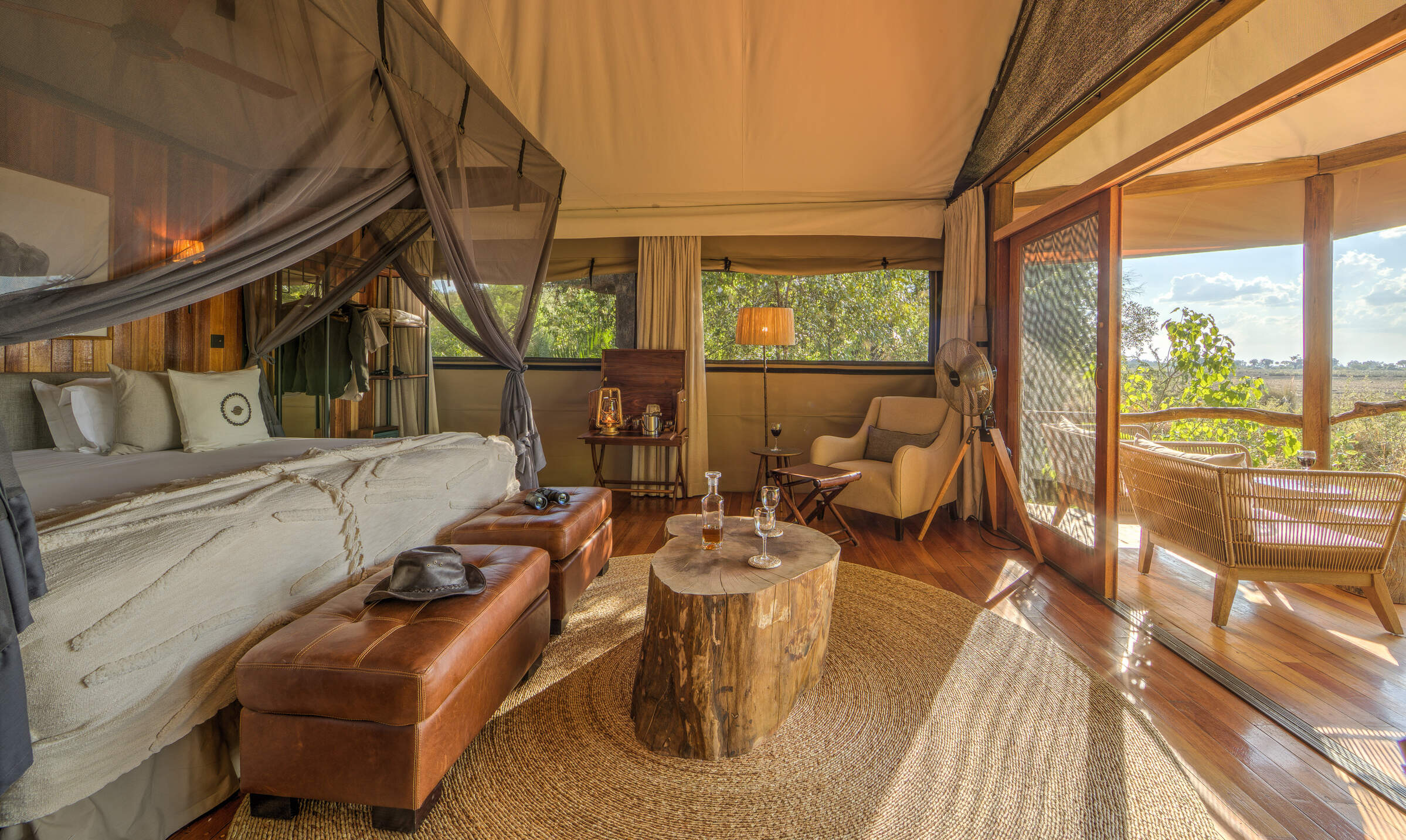
Kanana
In a beautiful part of the Delta, Kanana focuses on fantastic water activities and birding – including exclusive access to an impressive heronry.
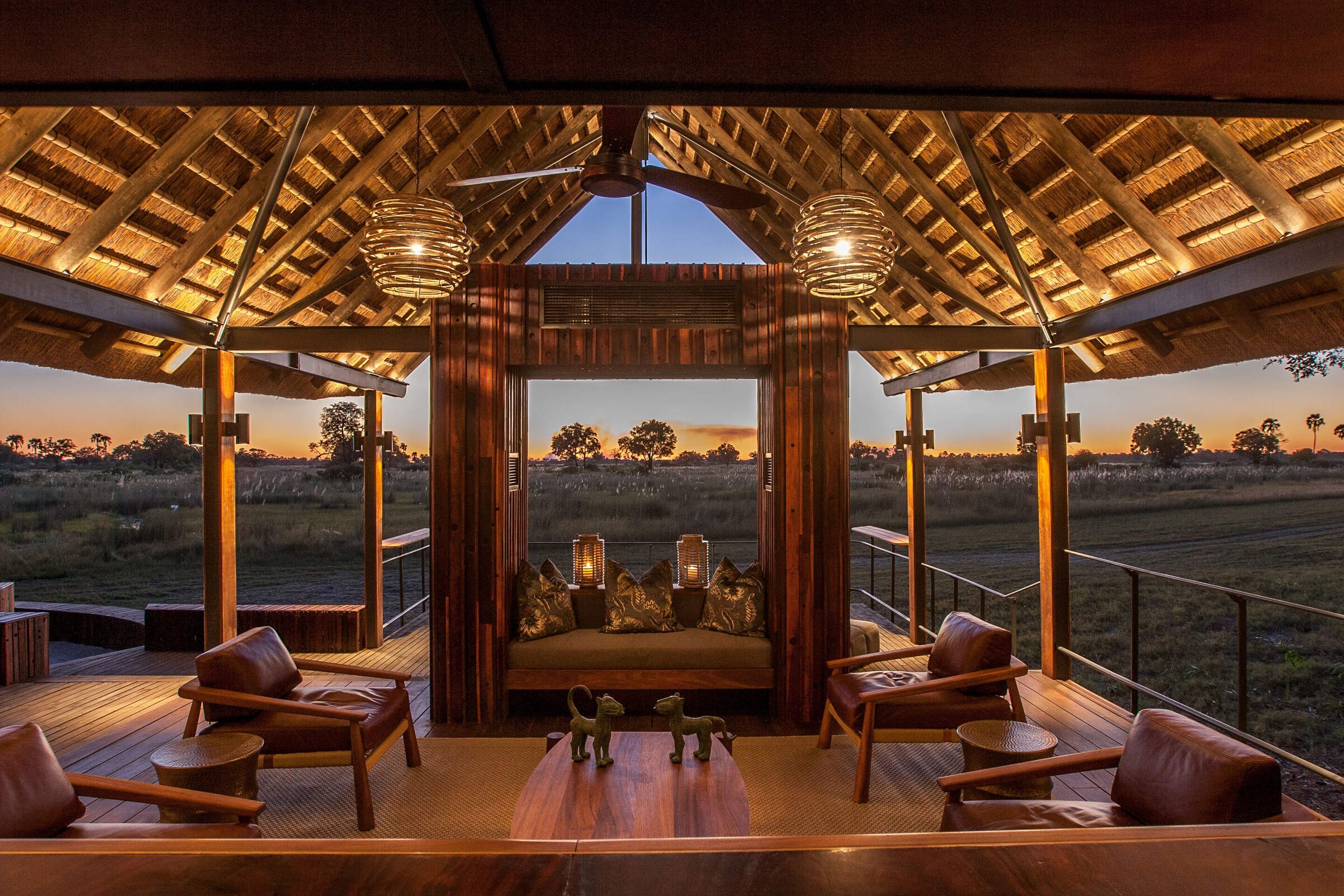
Chitabe Camp
In the southern Okavango Delta, the excellent Chitabe Camp concentrates on dry-land safaris in an area that we've found particularly good for wild dog sightings.
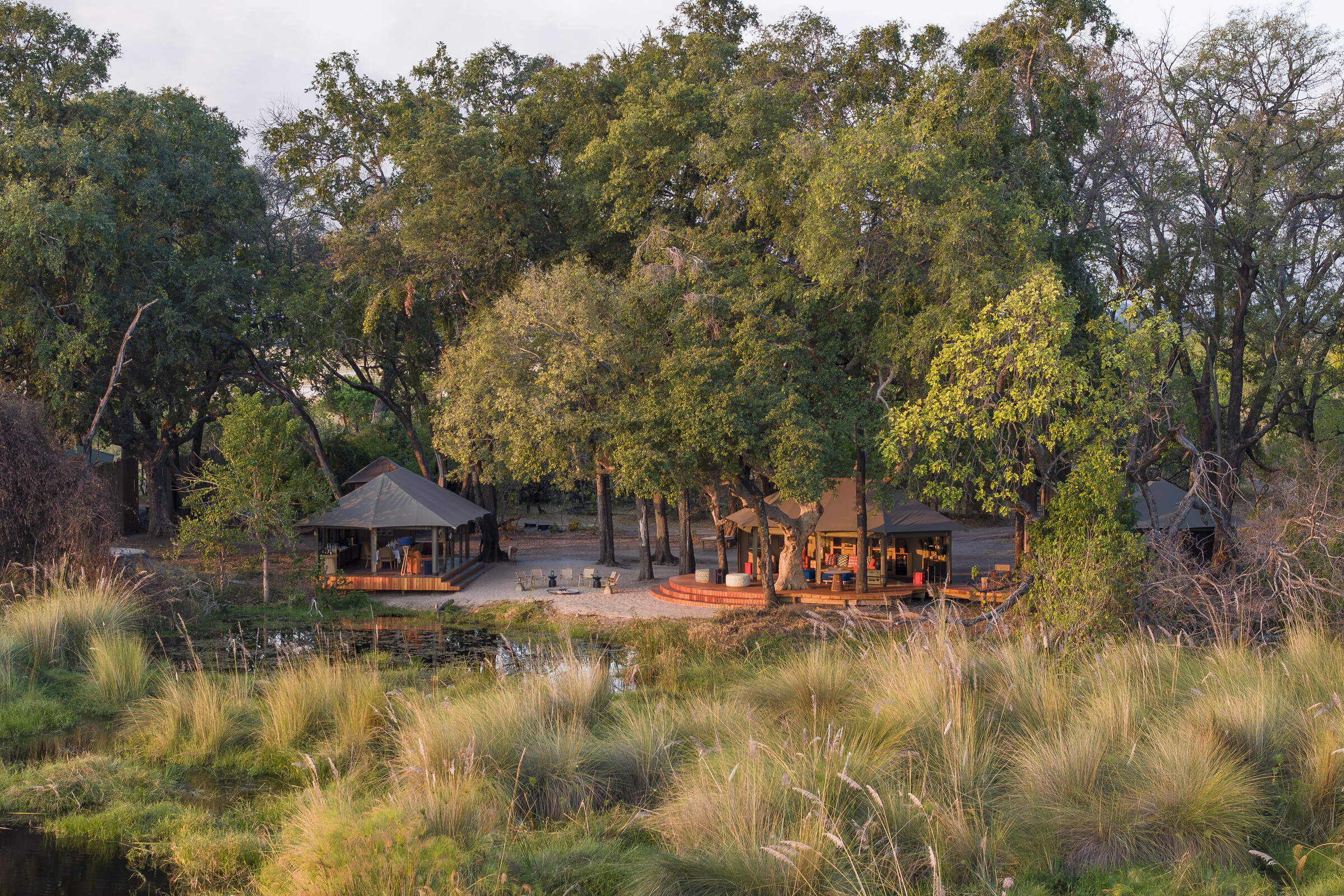
Shinde Footsteps
Small and simple, but comfortable, Shinde Footsteps focuses on walking safaris as well as game drives; it also runs a special children's programme so is particularly suitable for families.
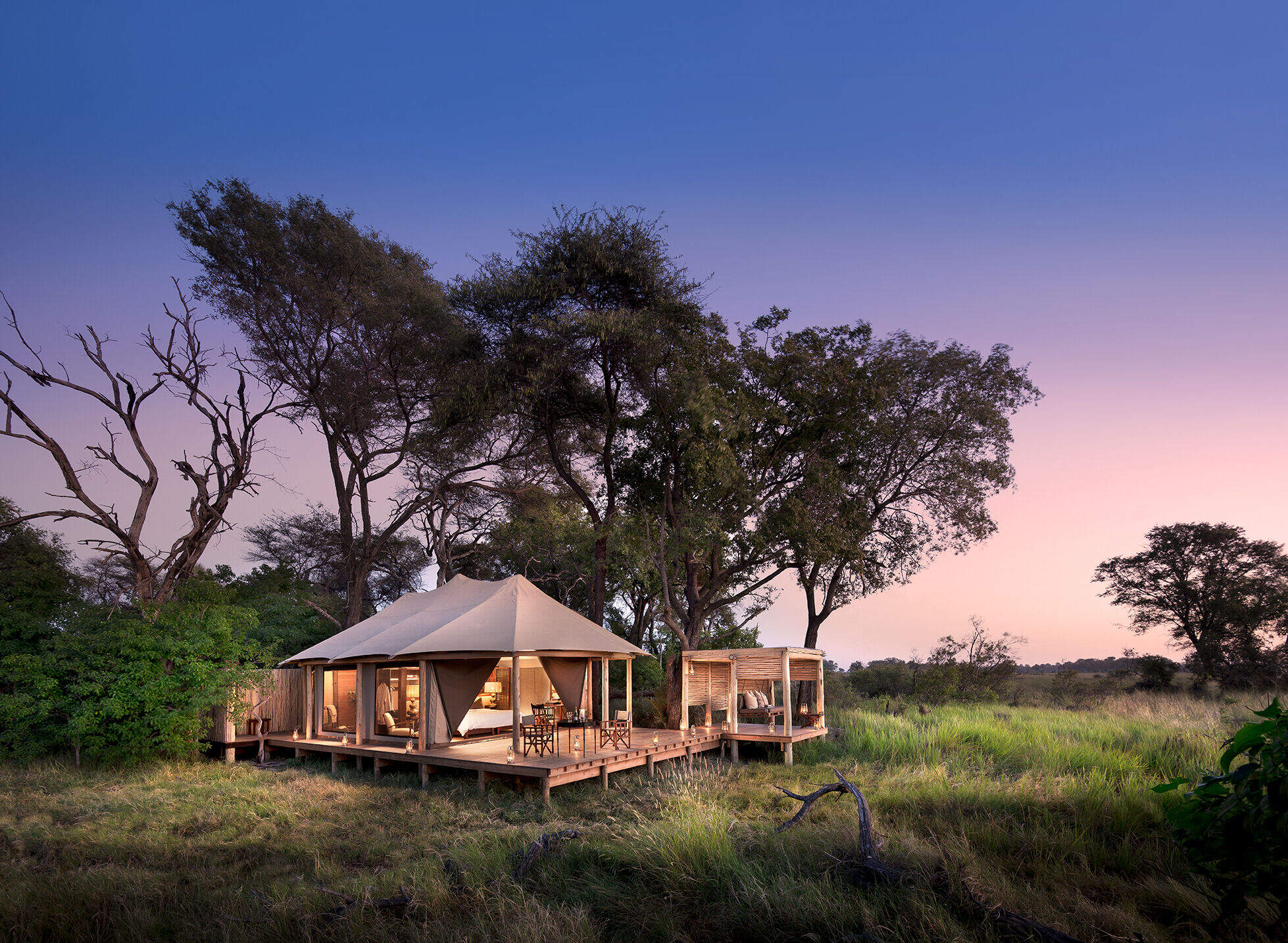
Nxabega Tented Camp
Nxabega offers a selection of both land- and water-based activities, plus very good guiding, food and service, but game viewing can be somewhat erratic.
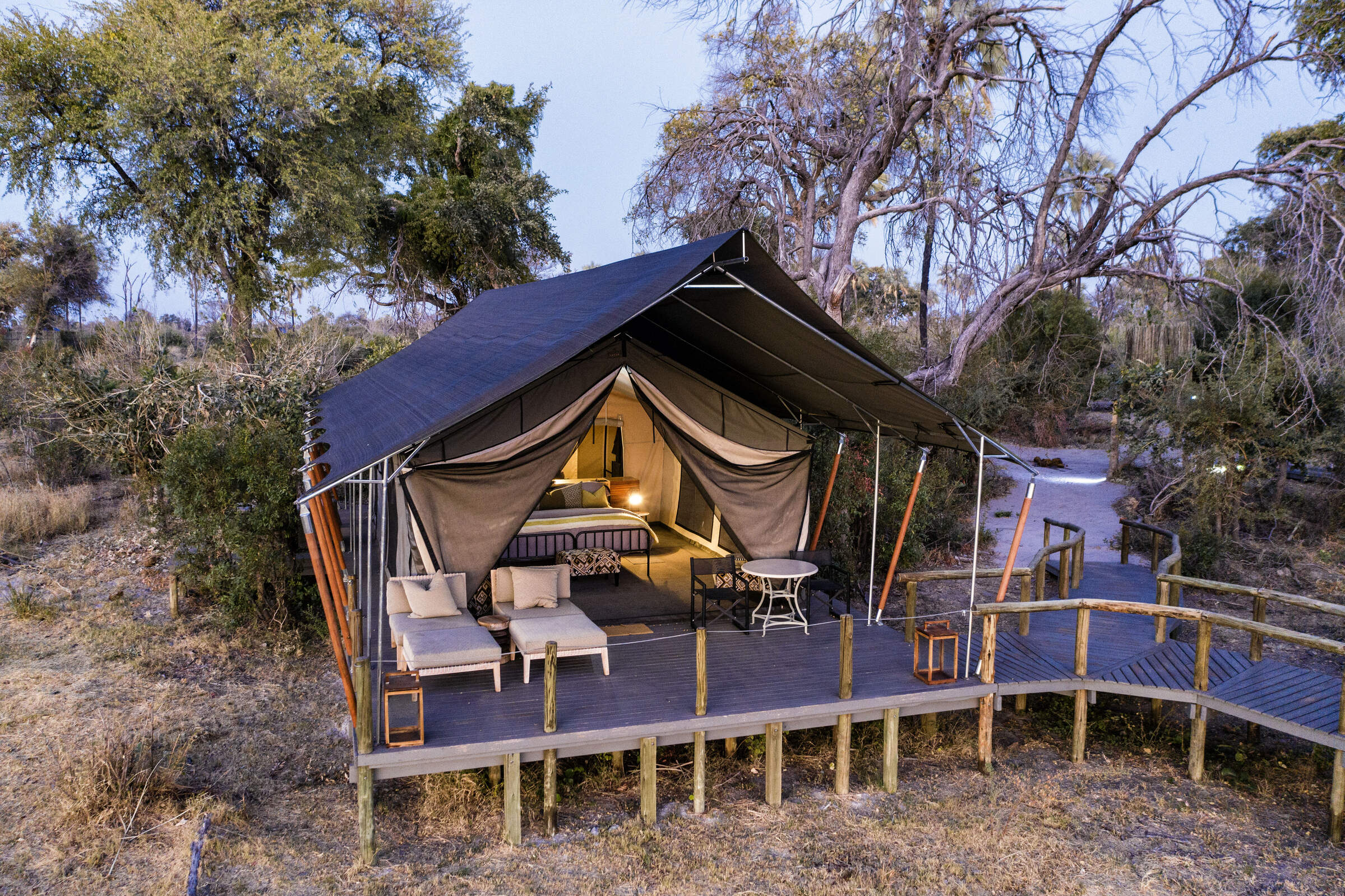
Gomoti Plains
Overlooking a tributary of the Gomoti River, Gomoti Plains Camp is a classically designed camp with very comfortable tents in a good game-viewing area.
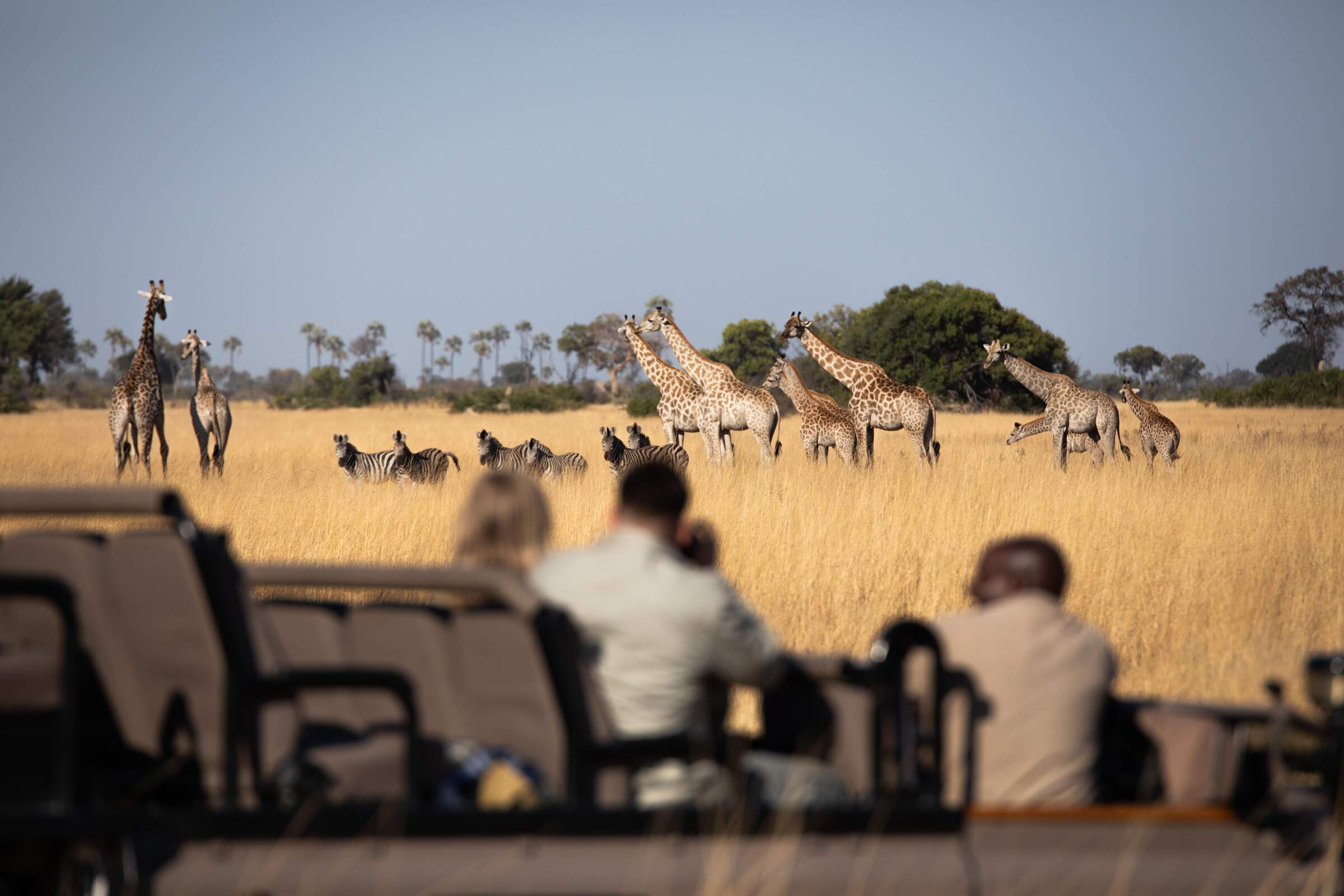
Tubu Tree Camp
A traditional tented camp with a distinctive tree-house feel, Tubu Tree offers some of the best game viewing in the Jao Reserve.
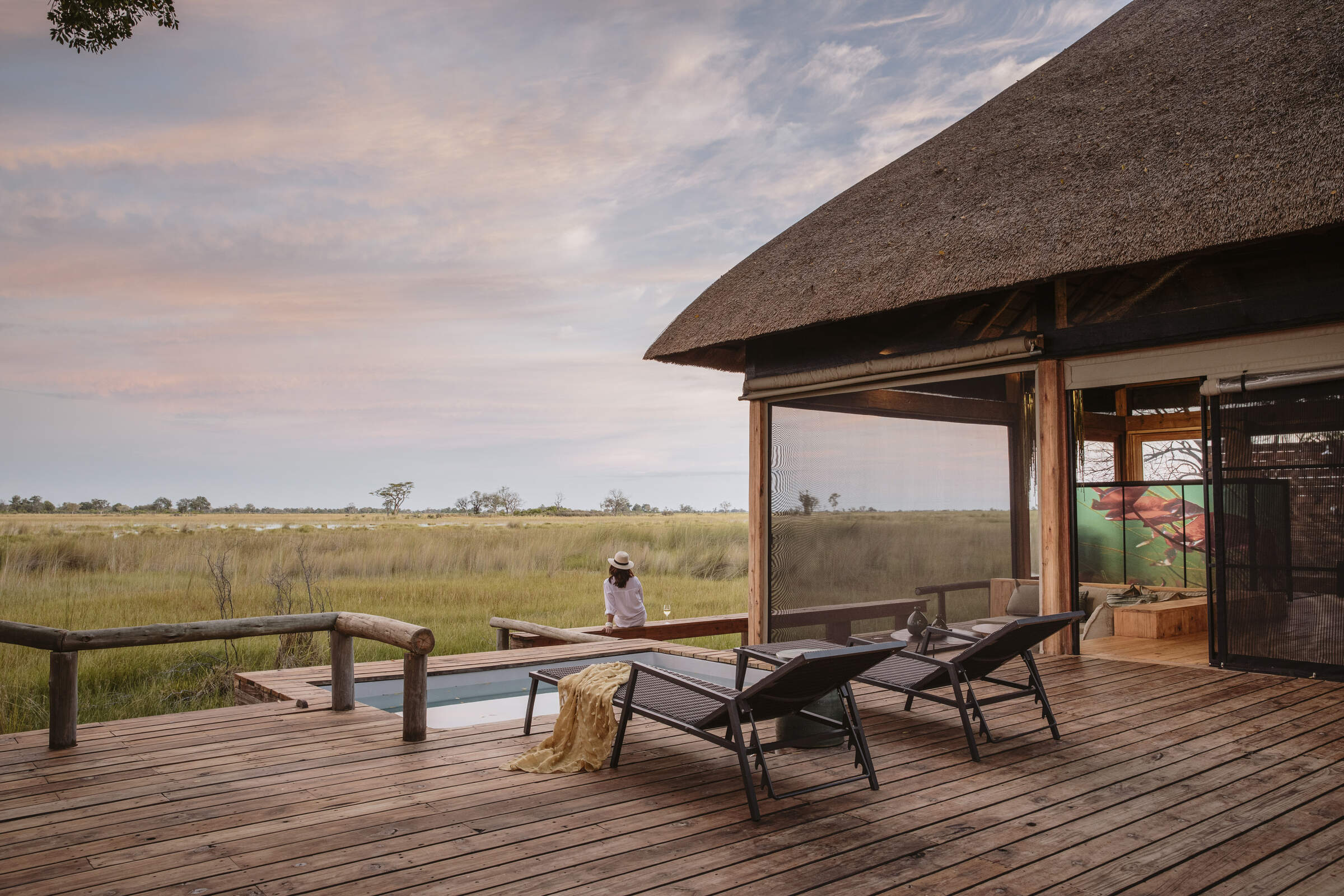
Vumbura Plains
Indulgently stylish and luxurious, Vumbura Plains offers superb game viewing and birding on an exceptionally varied private reserve.
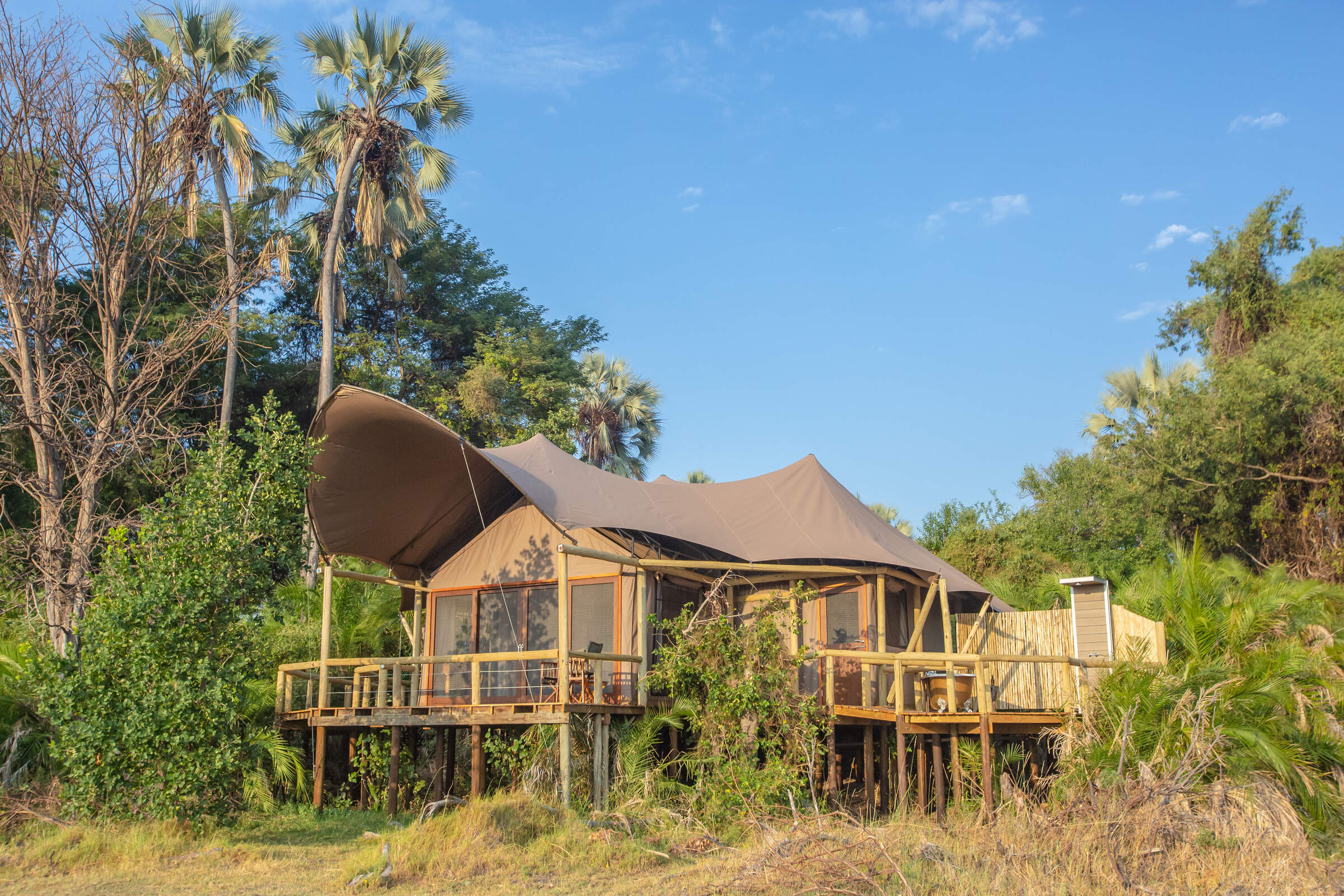
Jacana Camp
Jacana Camp is a small safari camp with an informal island feel; it is ideal for water-based activities in the Delta and offers excellent birdwatching.
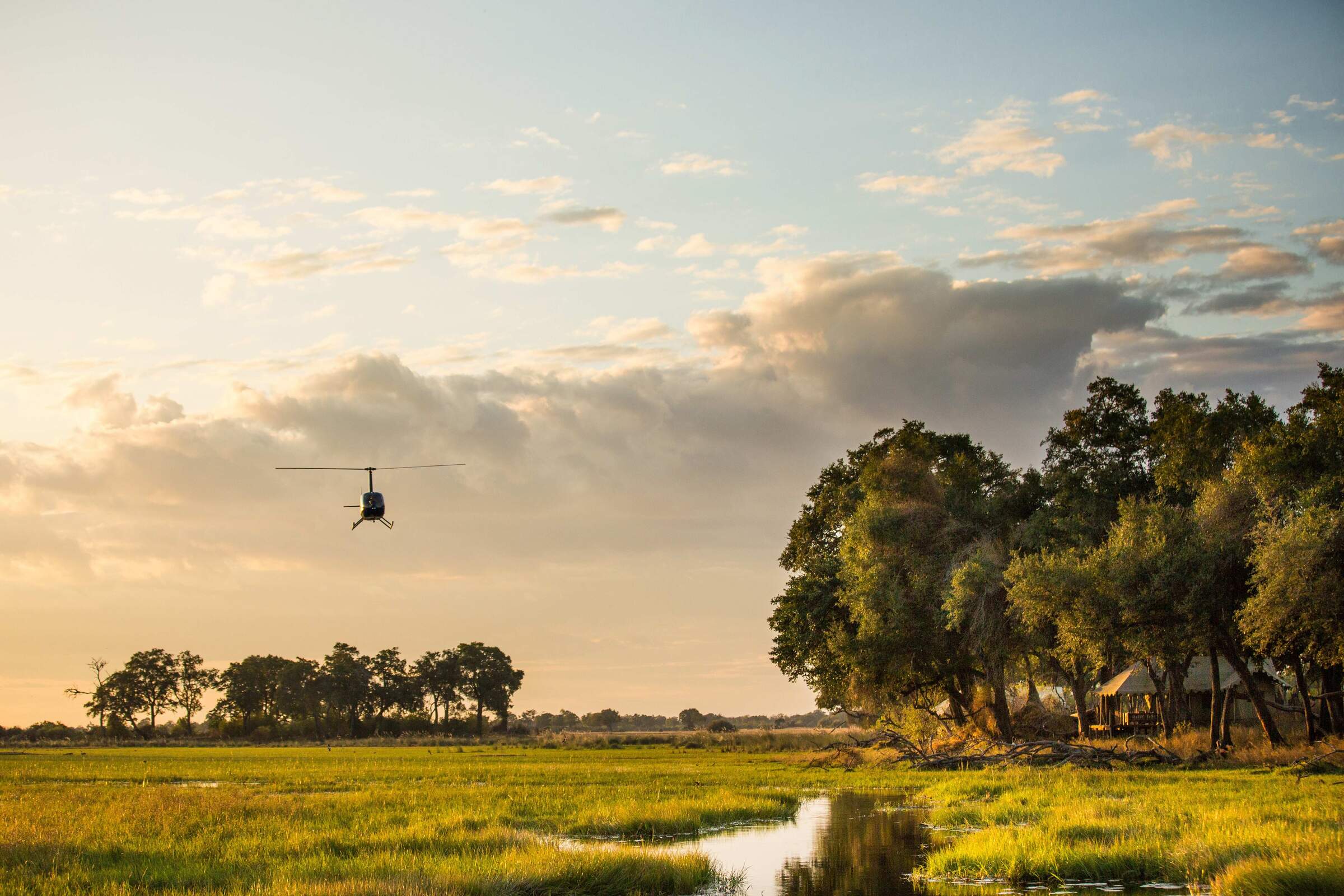
Duba Explorers Camp
Intimate and elegant, Duba Explorers Camp promises a firm safari focus in a remote corner of the Okavango, led by a team who value the highest guiding and hosting standards.
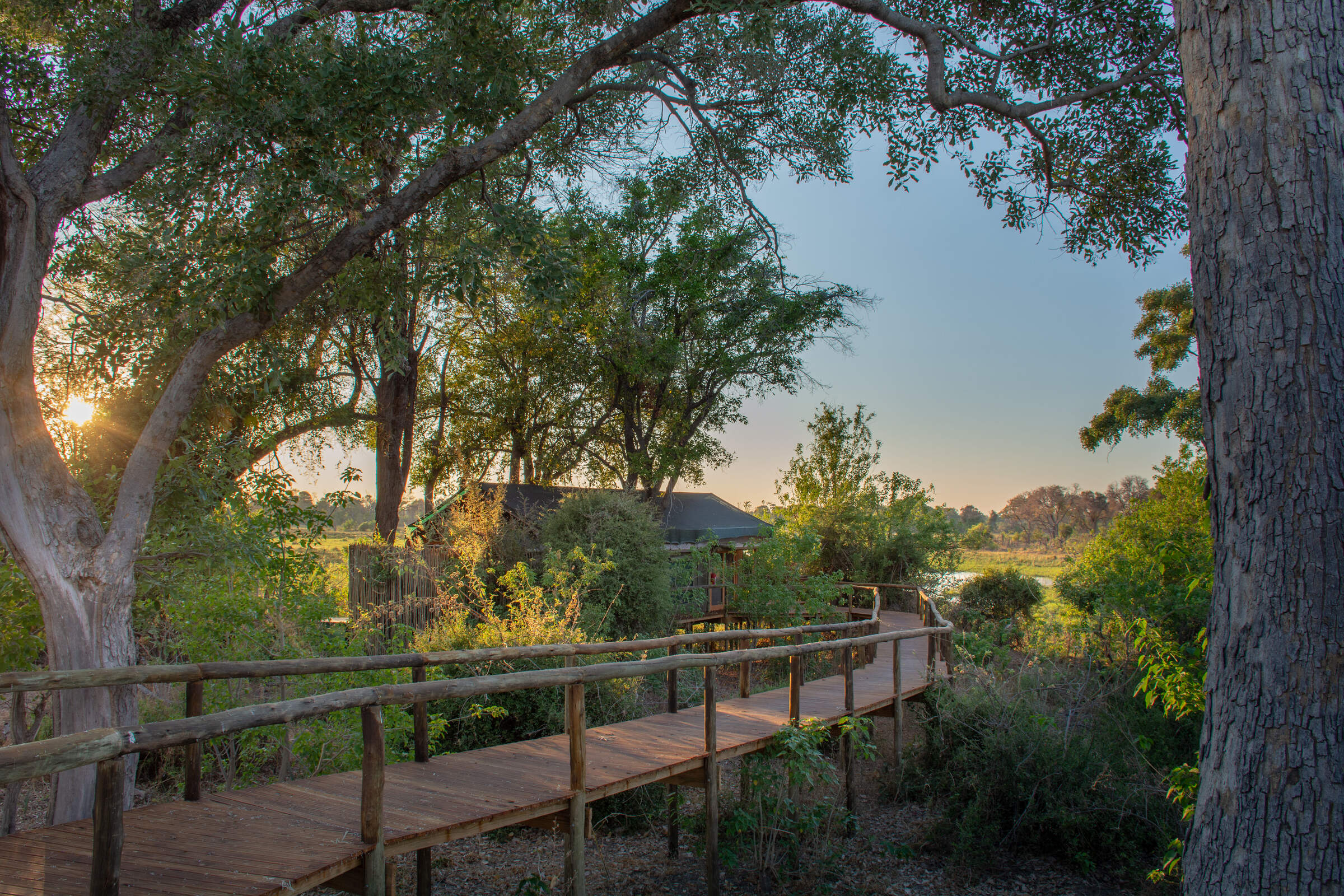
Mma Dinare
Beautifully located in a private concession overlooking the Gomoti River, the traditional Mma Dinare is very well-priced for the Okavango Delta.
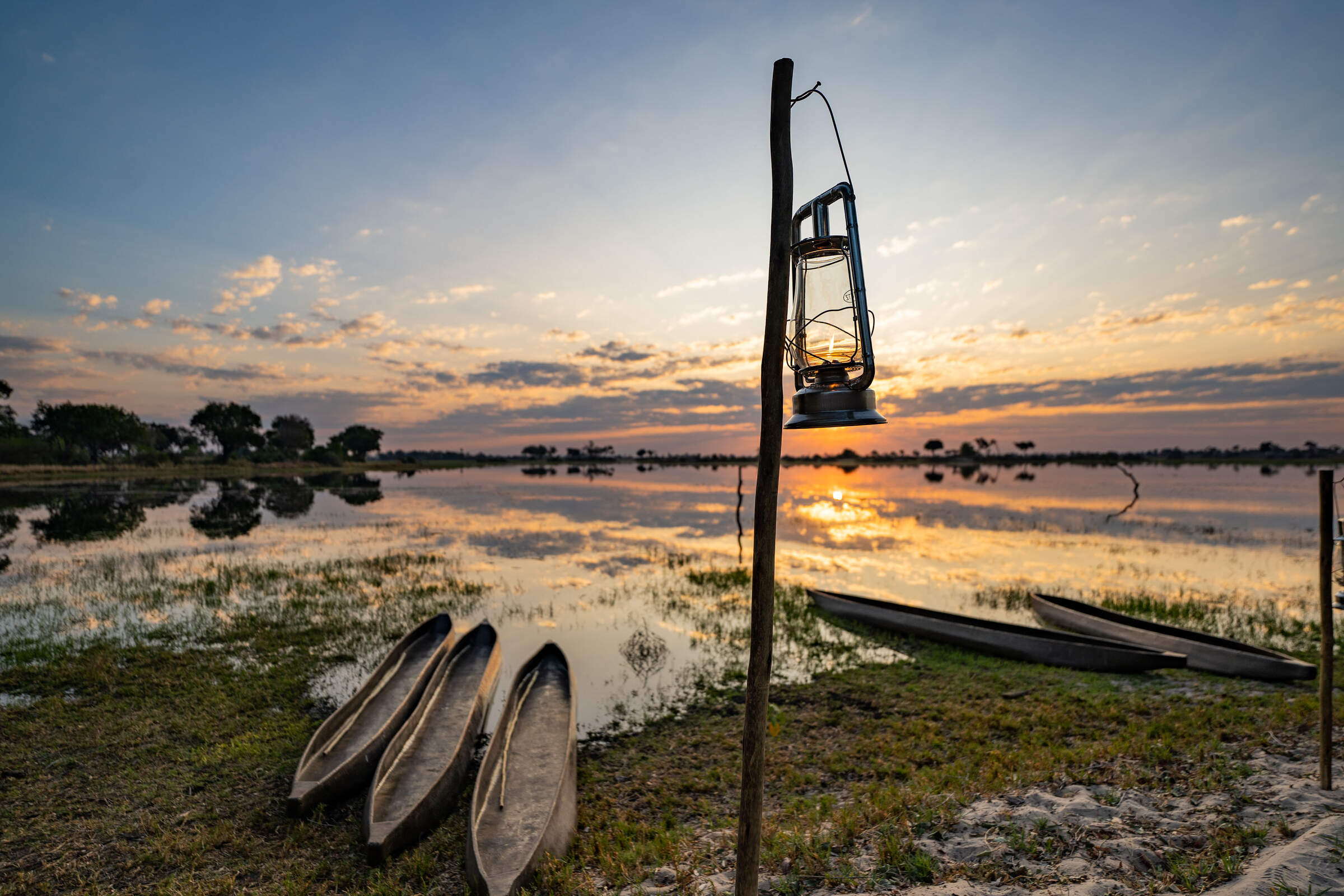
Pom Pom Camp
Amidst stunning Okavango Delta scenery, Pom Pom offers idyllic mokoro trips in season, great birdwatching, and increasingly good big-game sightings, especially leopards.
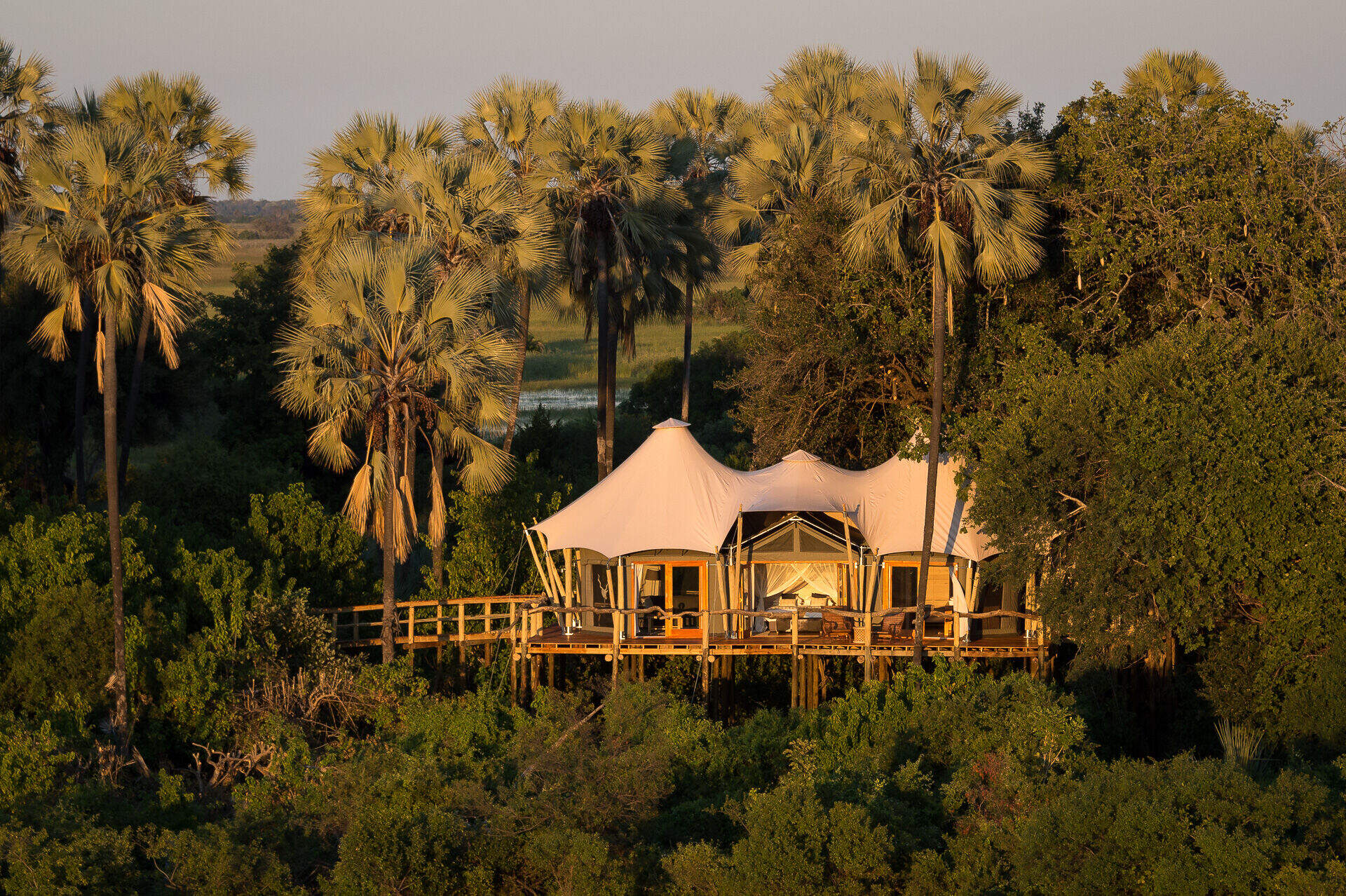
Kwetsani Camp
Deep in the Delta, overlooking a floodplain, Kwetsani Camp is a small, high-end camp with good access to areas for land and water-based activities.
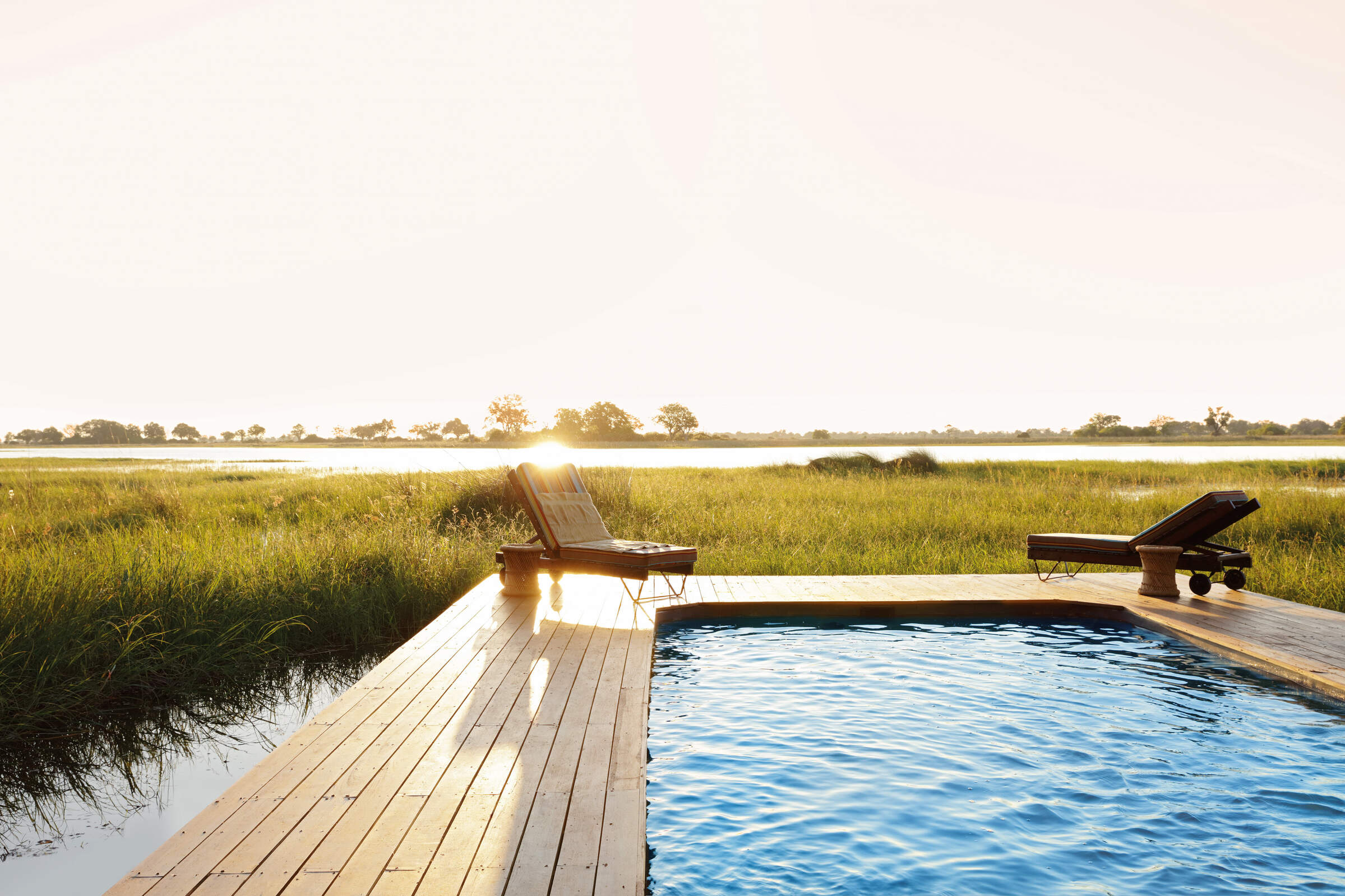
Mapula Lodge
For an affordable yet varied safari encompassing a range of eco-systems, the traditional Mapula Lodge takes a lot of beating.
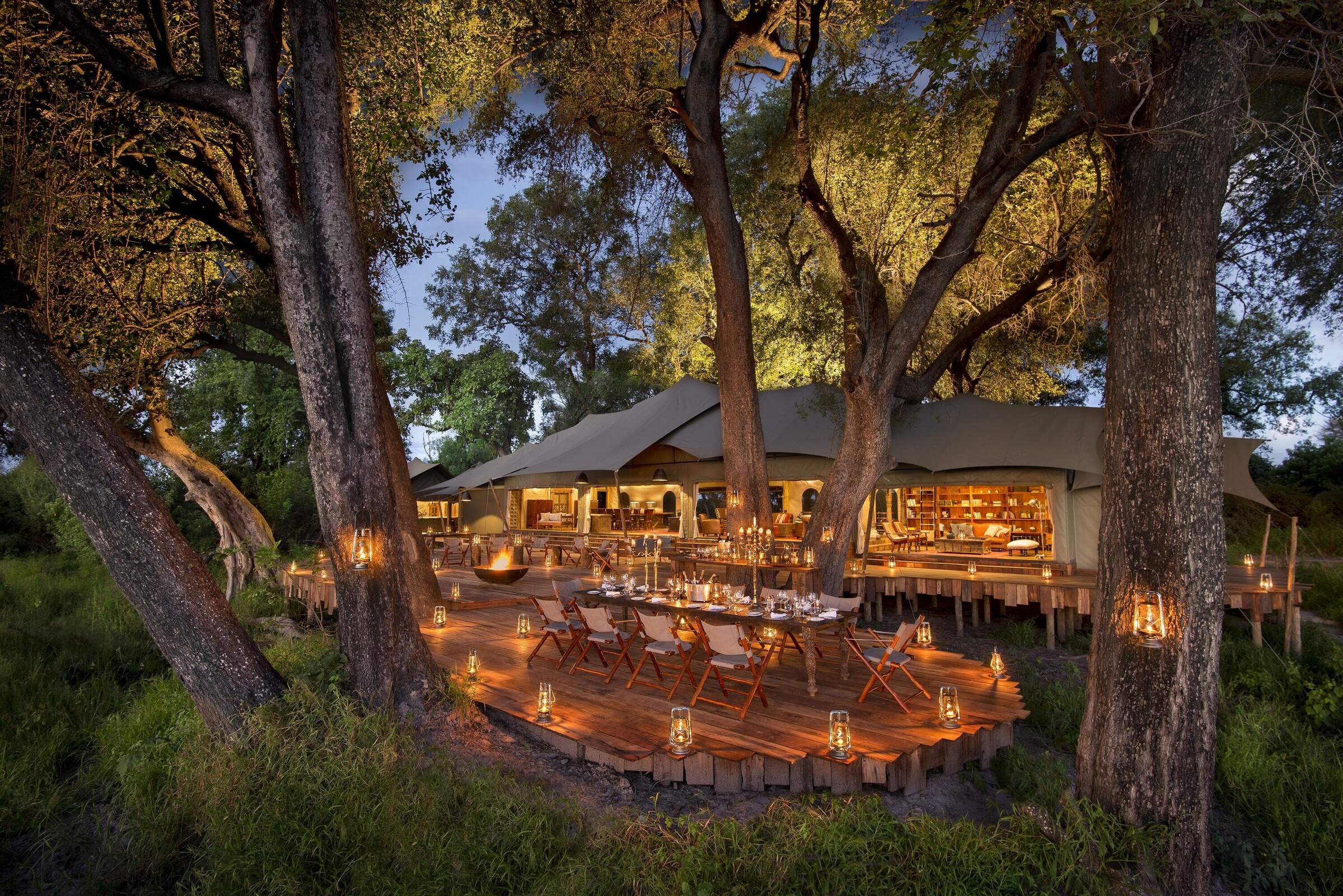
Duba Plains Camp
Duba Plains Camp is a traditional yet luxurious safari camp, best known for the thrilling lion behavior interaction that is often see during the day.
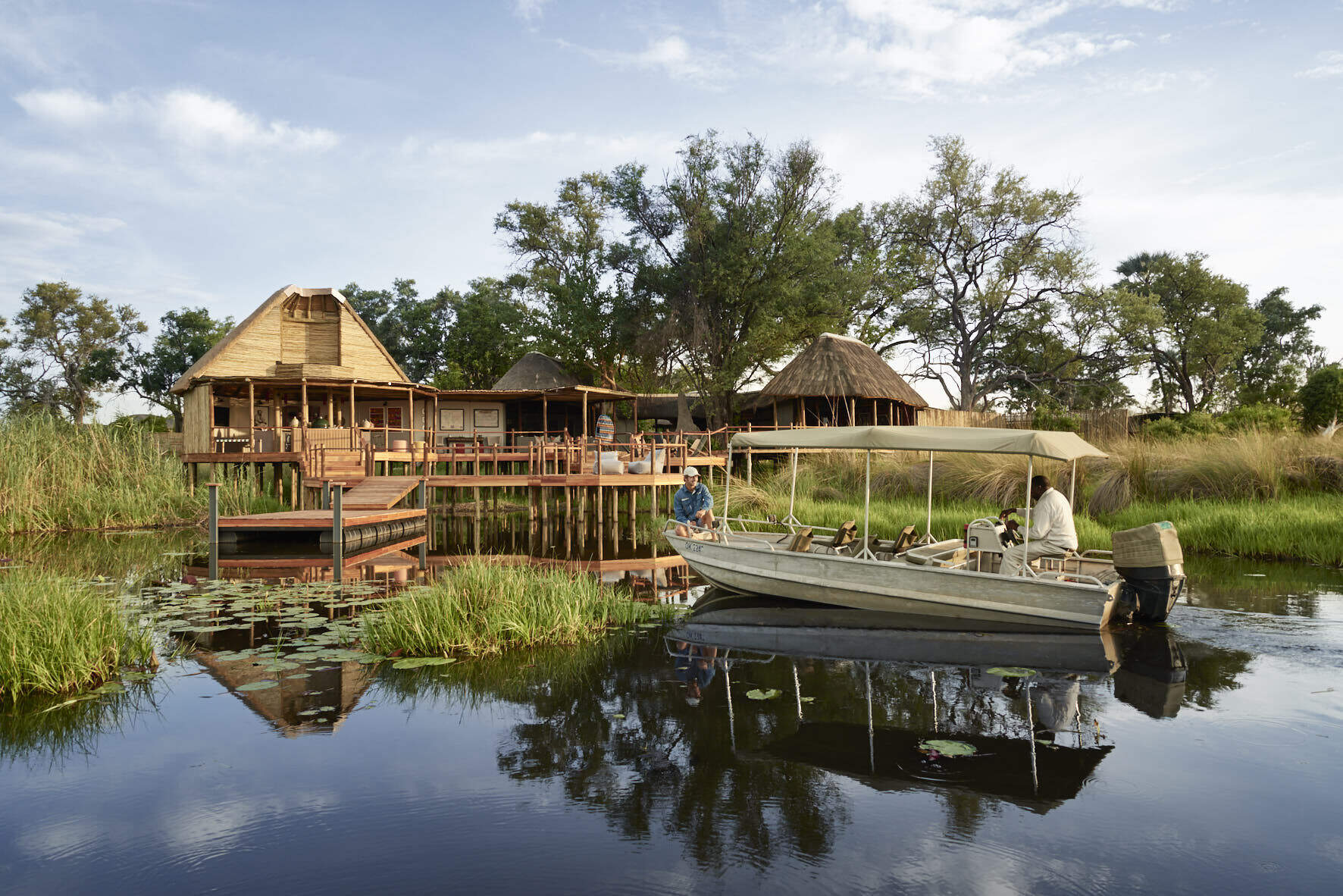
Baines' Camp
Baines' Camp is a well-run, intimate camp in a pretty part of the Okavango, offering a range of activities and the option to spend a morning walking with elephants.
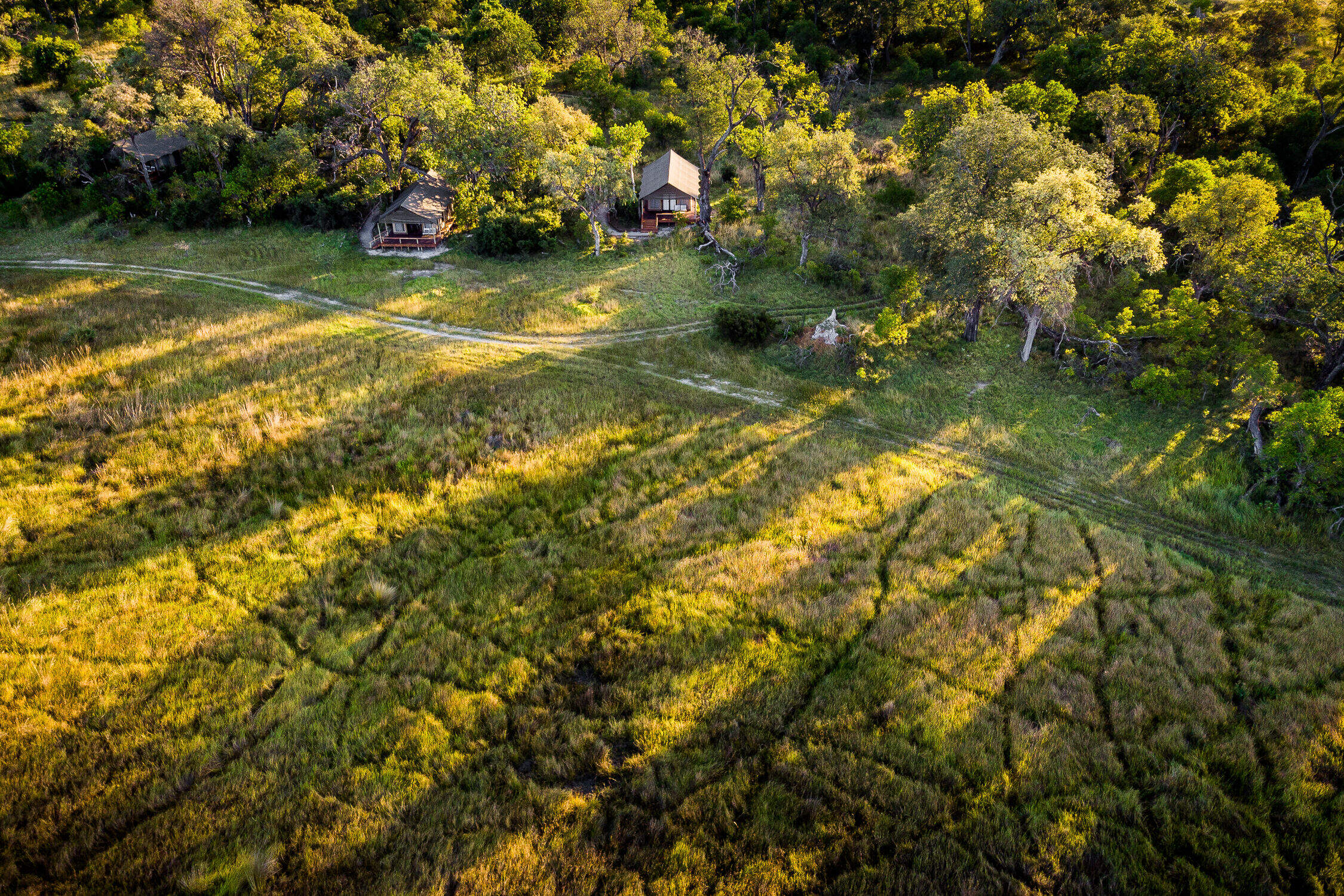
Stanley's Camp
In a private concession south of Moremi Game Reserve, Stanley's Camp offers 4WD game drives, seasonal water activities and a superb elephant interaction.
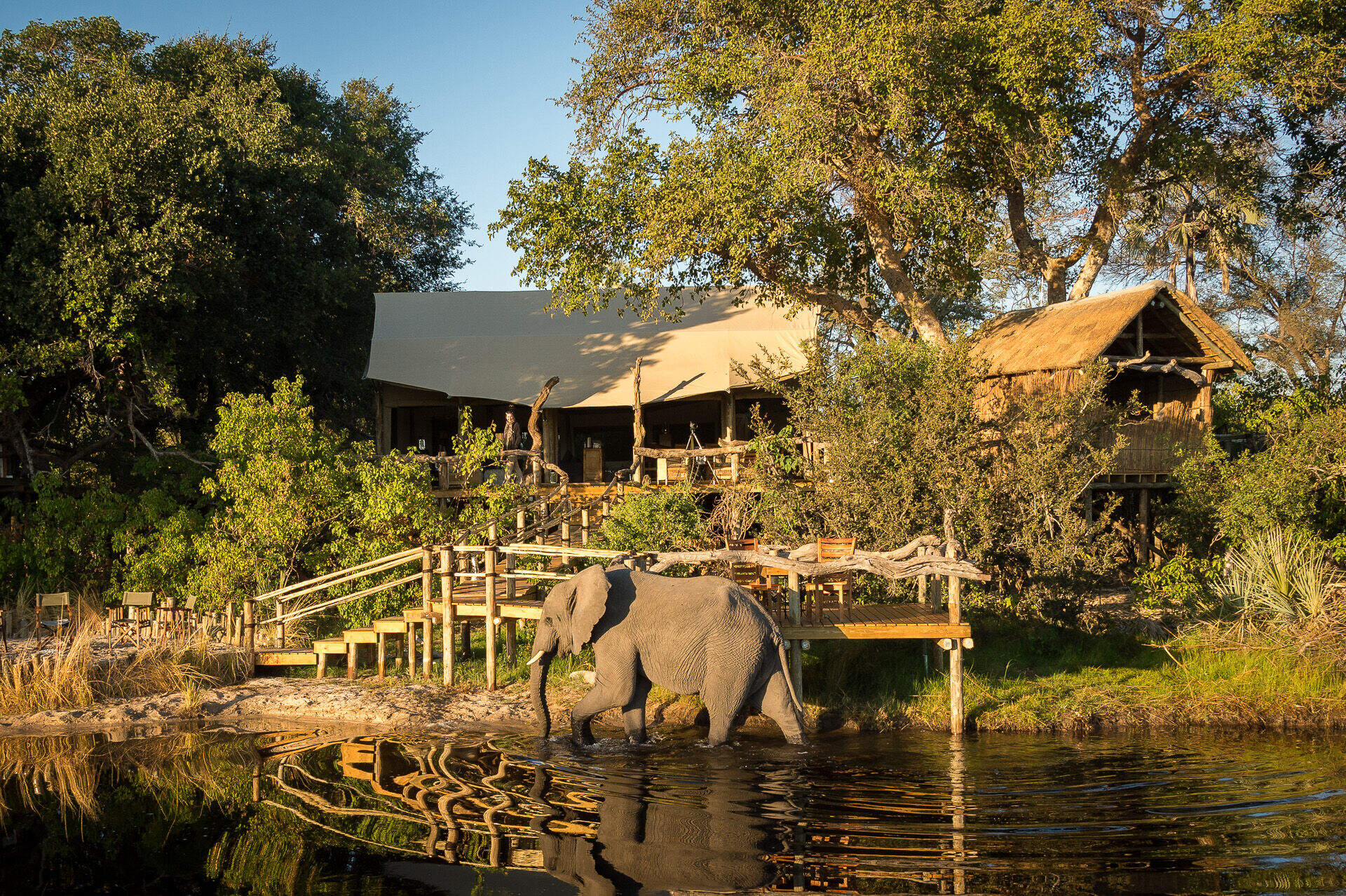
Little Tubu
Little Tubu is a new, traditional camp with just three tented chalets and a distinctive tree-house feel. The areas around it can be explored by water and land-based activities year round.
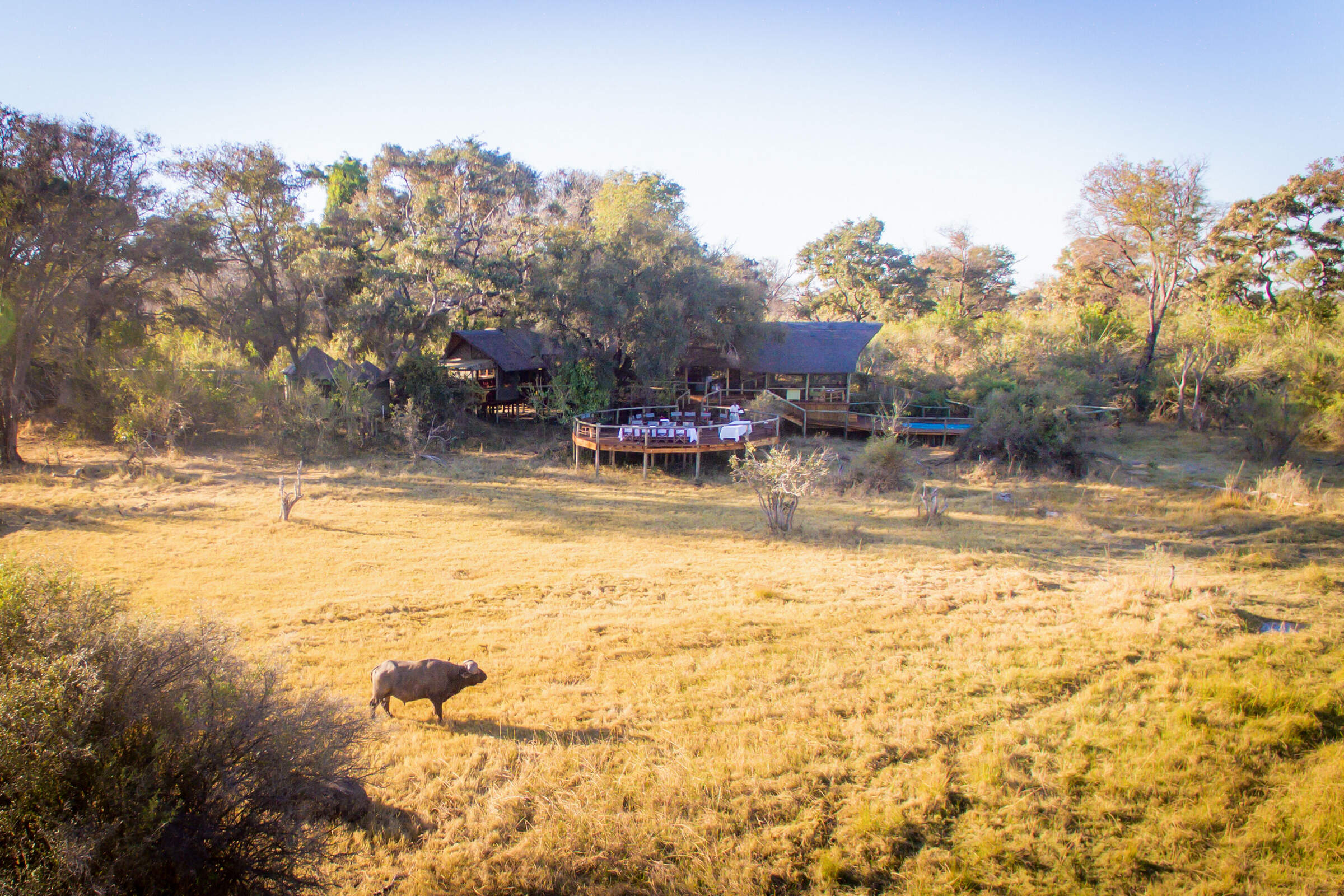
Rra Dinare
Located in a private concession in the southern reaches of the Okavango Delta, overlooking the Gomoti River, Rra Dinare is a traditional-style, well-priced camp.
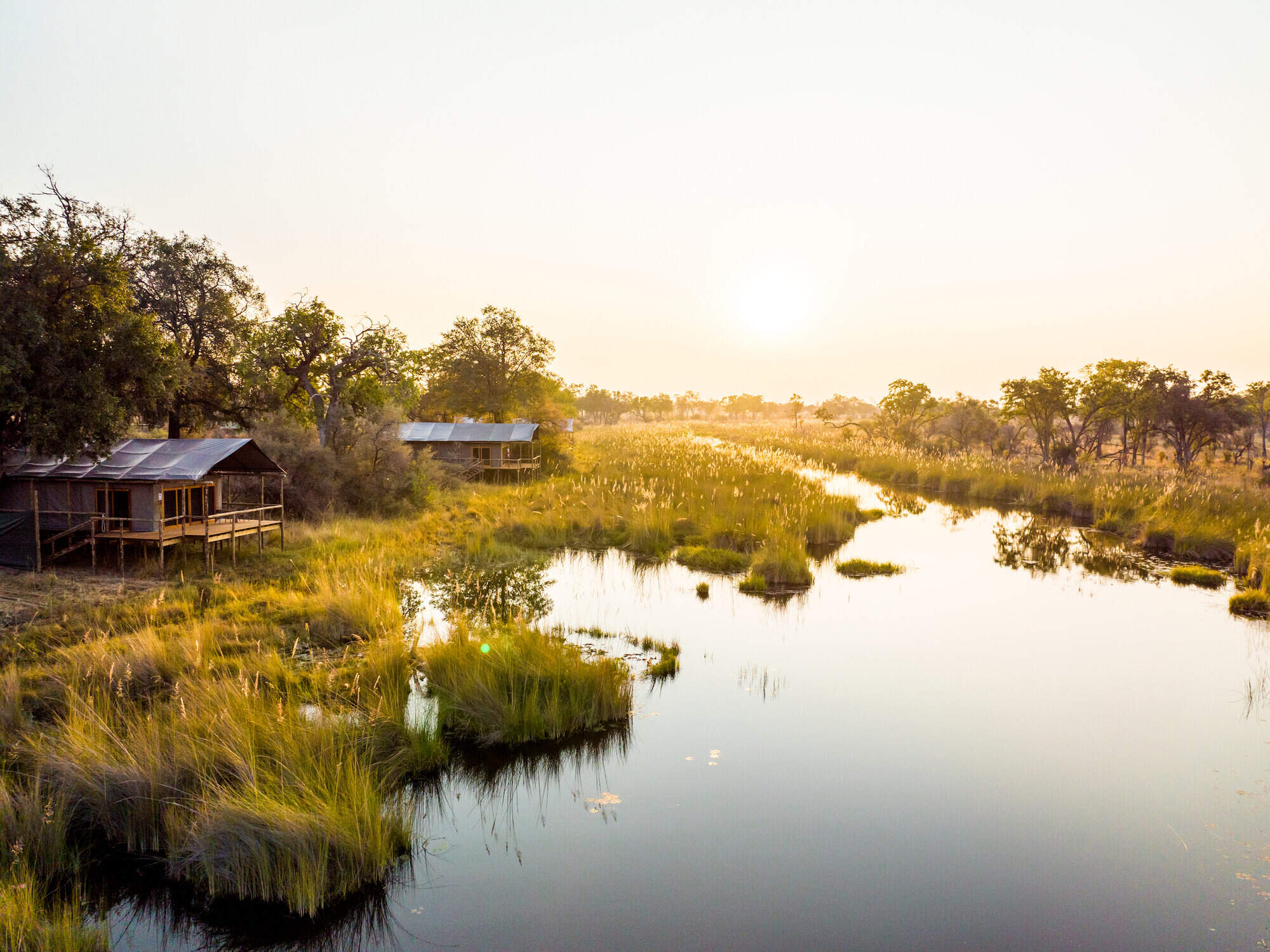
4 Rivers
4 Rivers is a new camp in a previously in accessible area of the excellent Kwara concession.
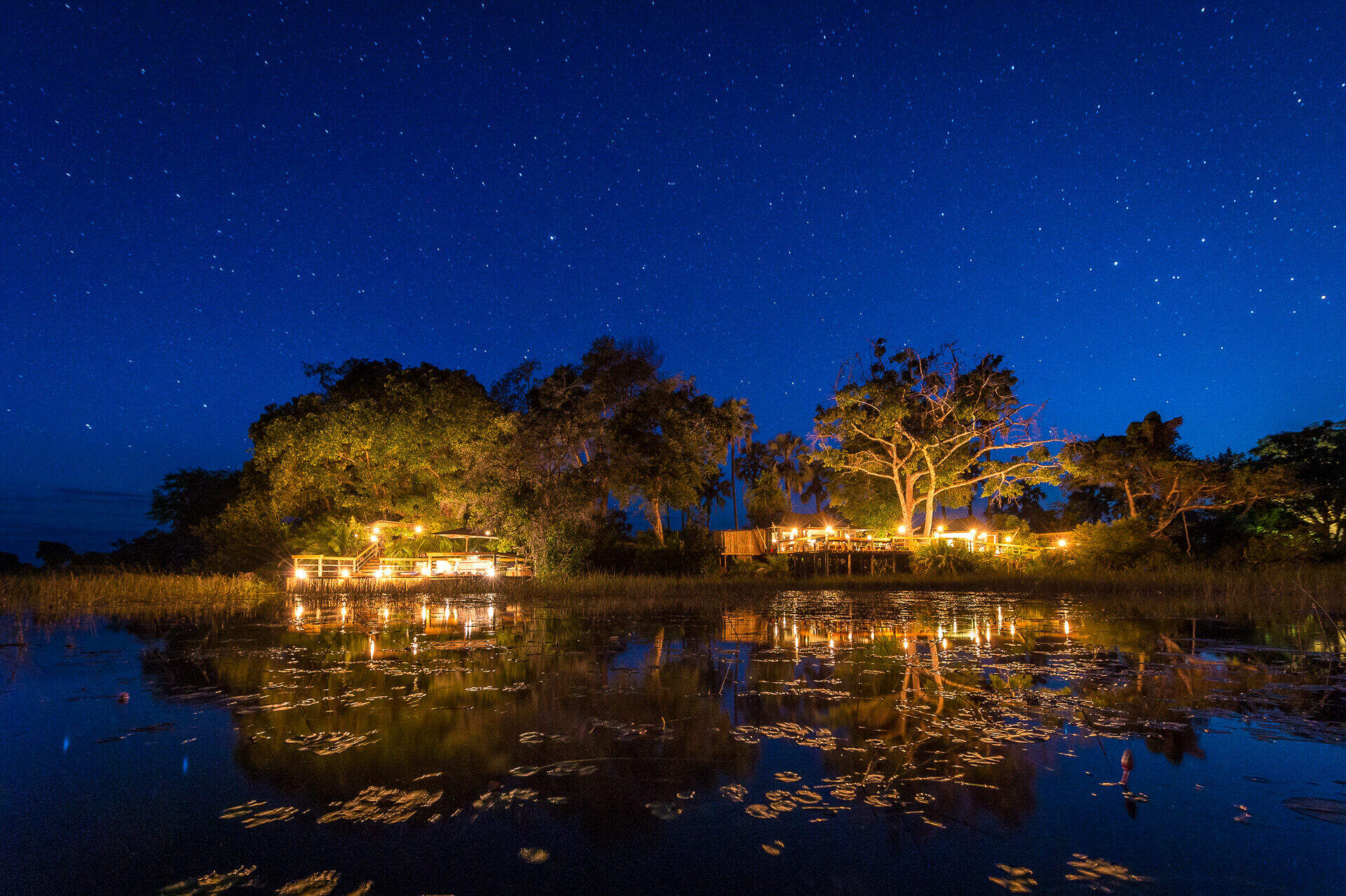
Pelo Camp
In a pristine wilderness environment deep in the Okavango Delta, the seasonal Pelo Camp is tented yet comfortable, with activities focusing on excursions by mokoro.
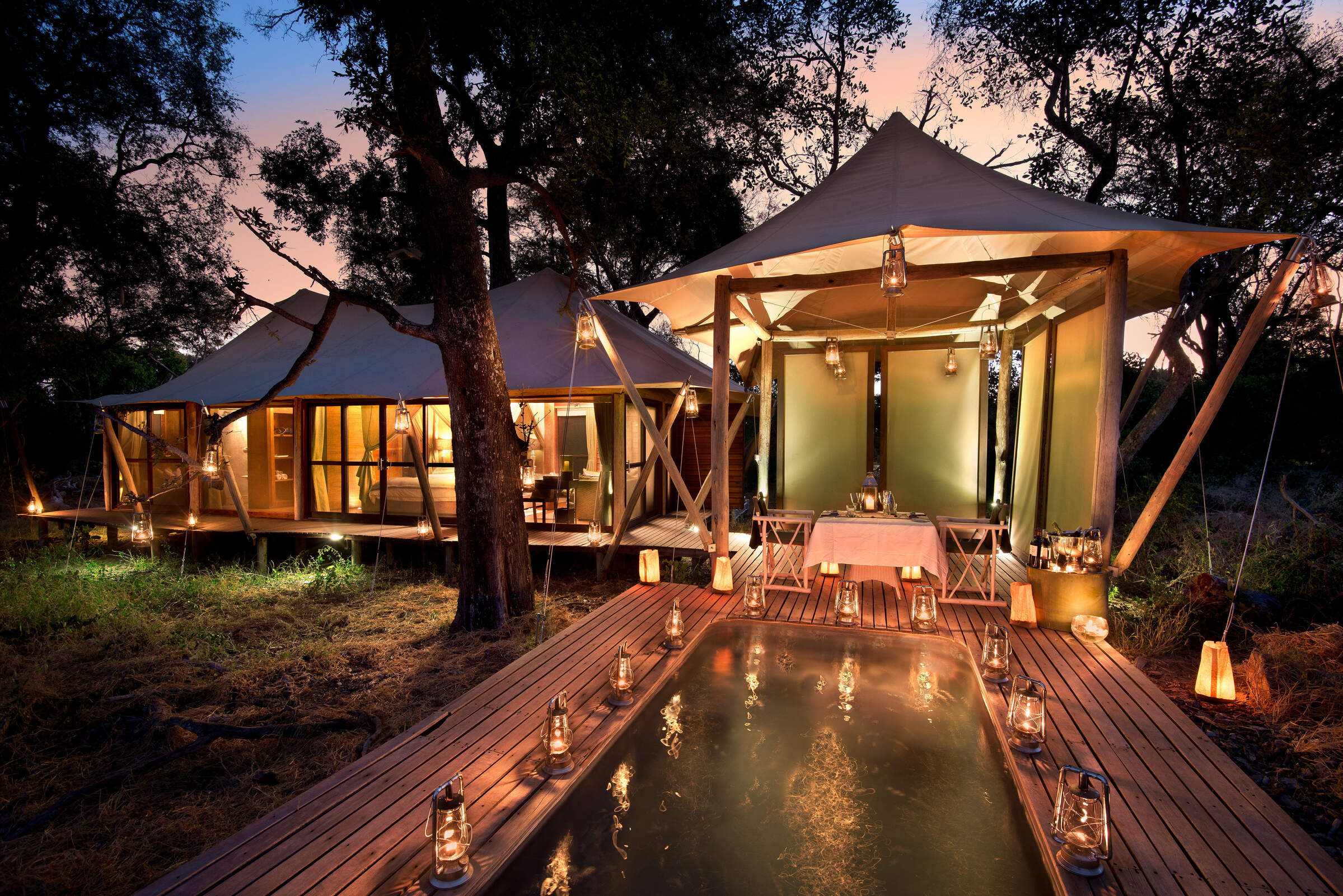
Xaranna
Xaranna is a plush tented camp amongst the idyllic waterways and islands of the Delta. Each air-conditioned tent has a plunge pool. Water activities and pampering are the focus here.
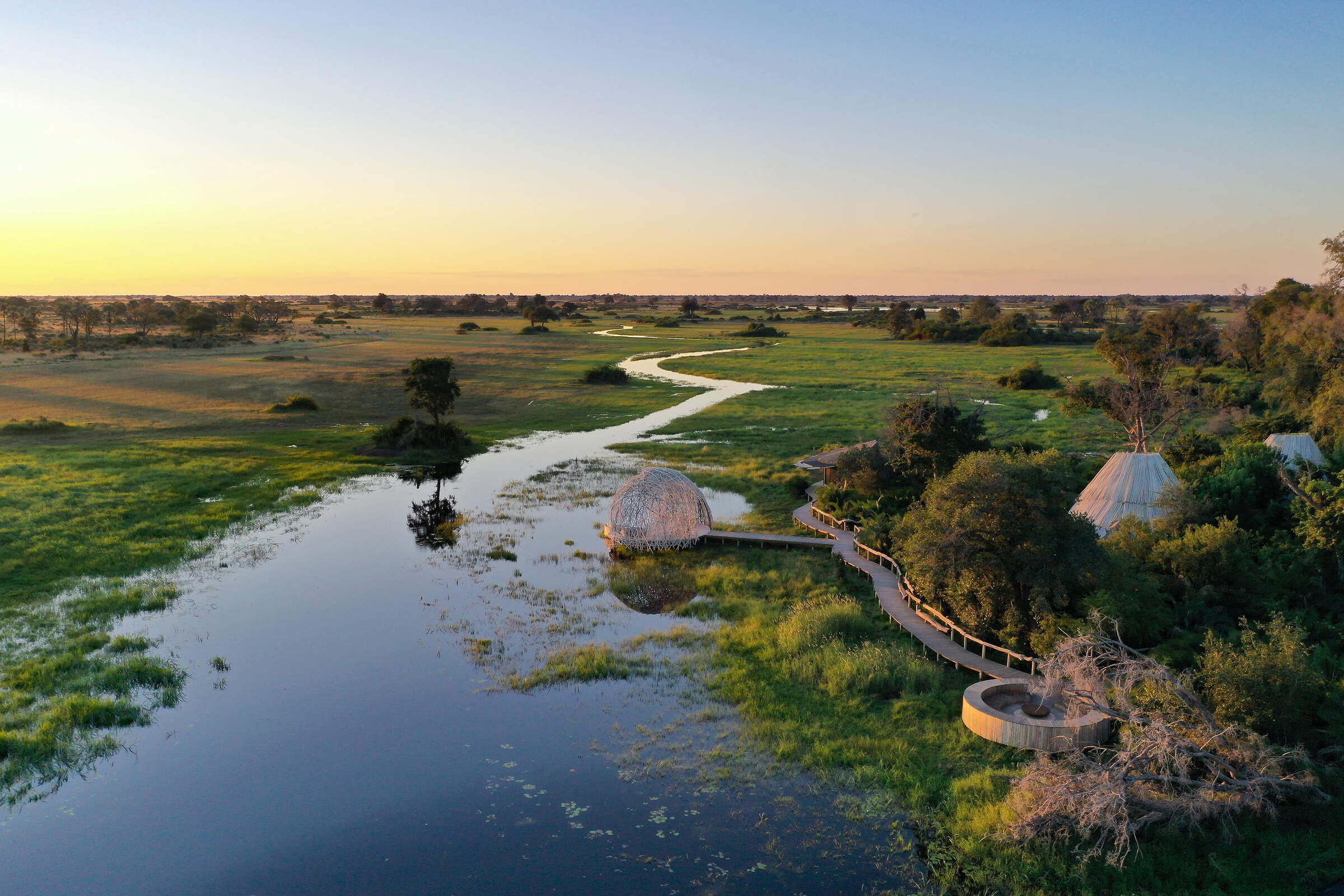
Jao Camp
In a beautiful area with fantastic water activities, Jao combines an idyllic location with high levels of luxury and service, and a top-end spa.
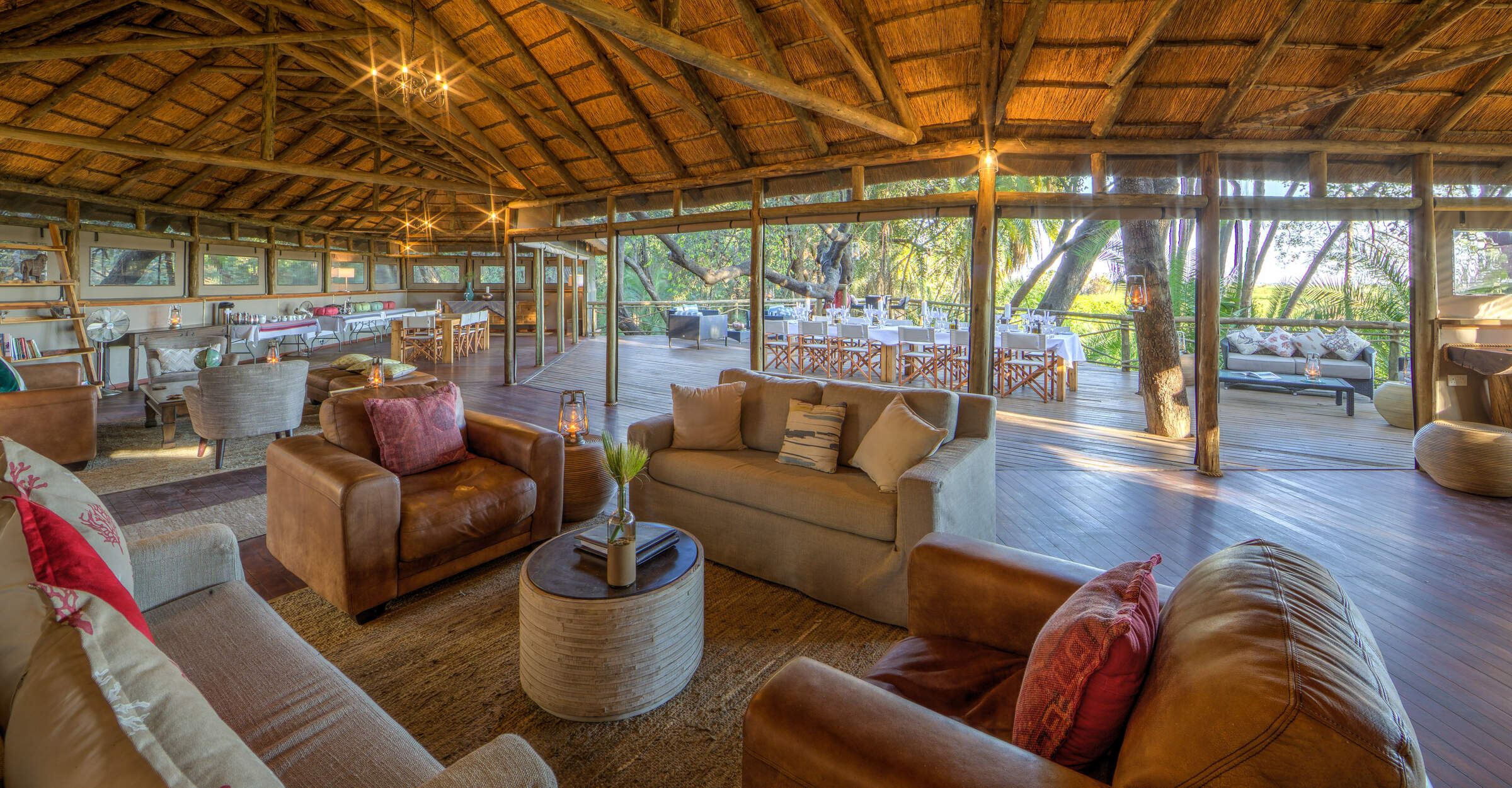
Setari Camp
Setari Camp stands on an island dotted with palm trees, close to the base of the Okavango's 'Panhandle", offering primarily water-based activities.
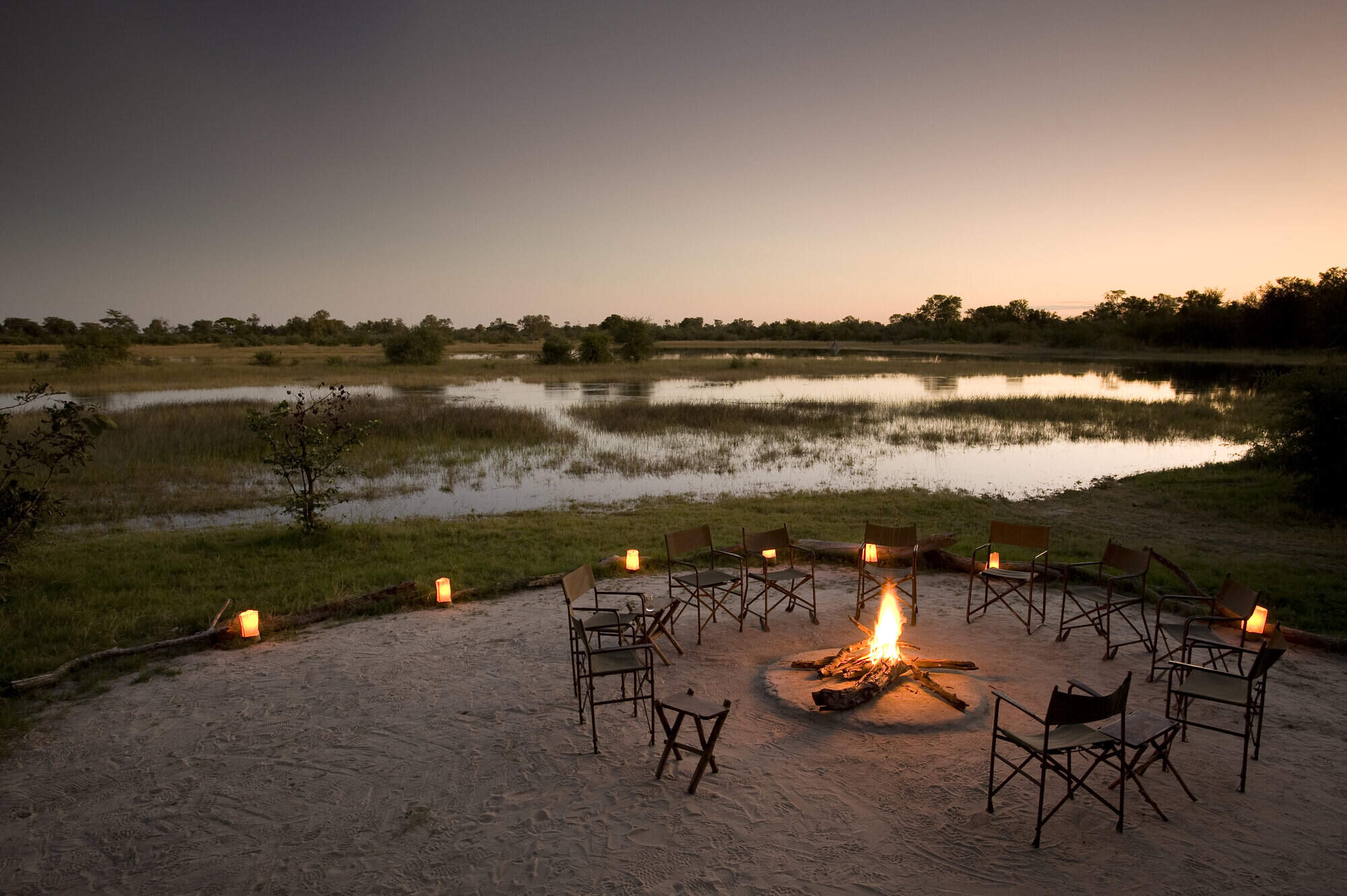
Okavango Explorers
The traditional, tented Okavango Explorers Camp offers a mix of walking, canoeing and game drives led by great guides in a wildlife-rich area.
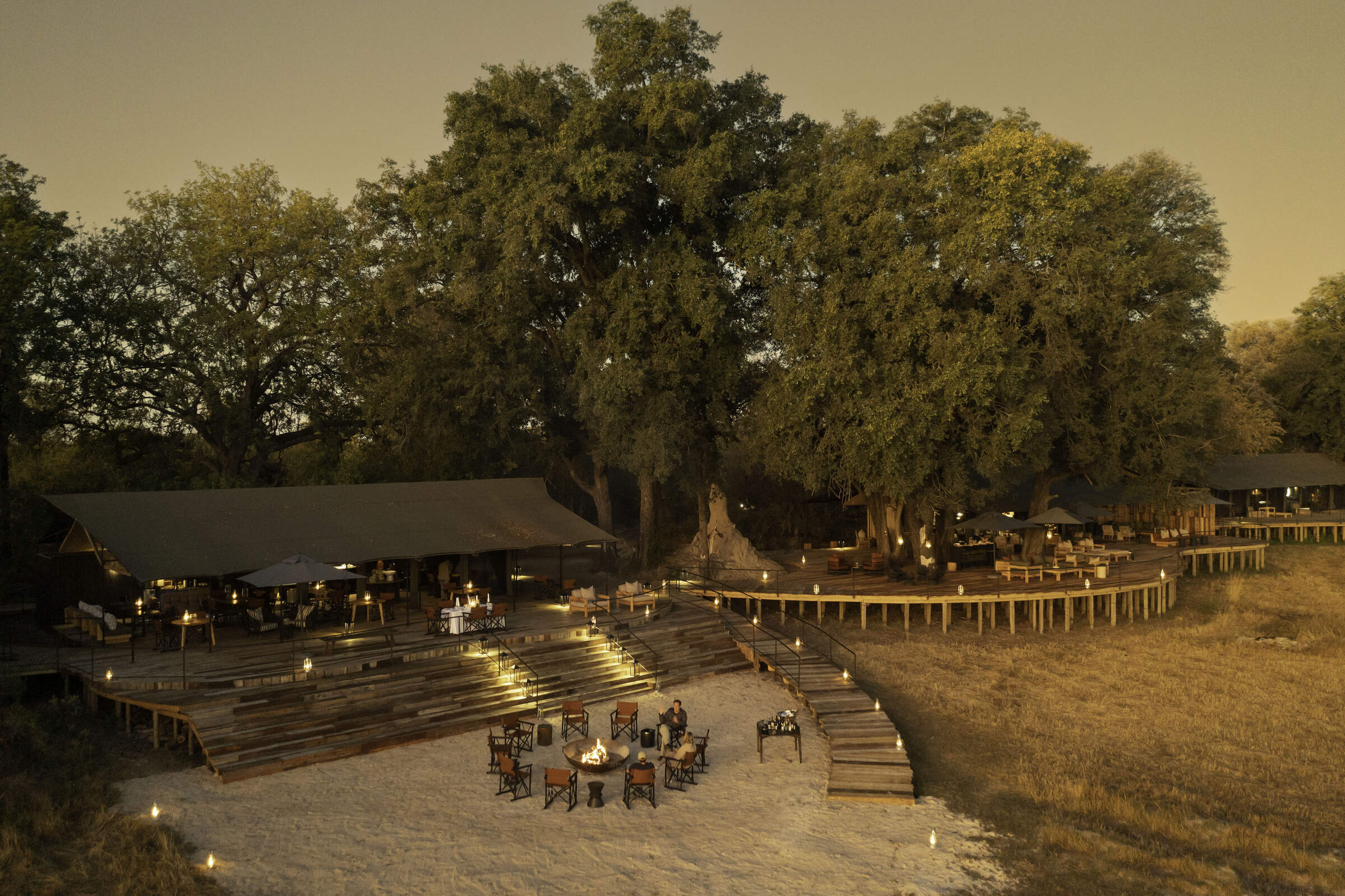
Kiri Camp
Kiri Camp is the latest Okavango offering from the excellent team behind Machaba. In an exciting new location in the heart of the Delta we cannot wait to visit this new camp.
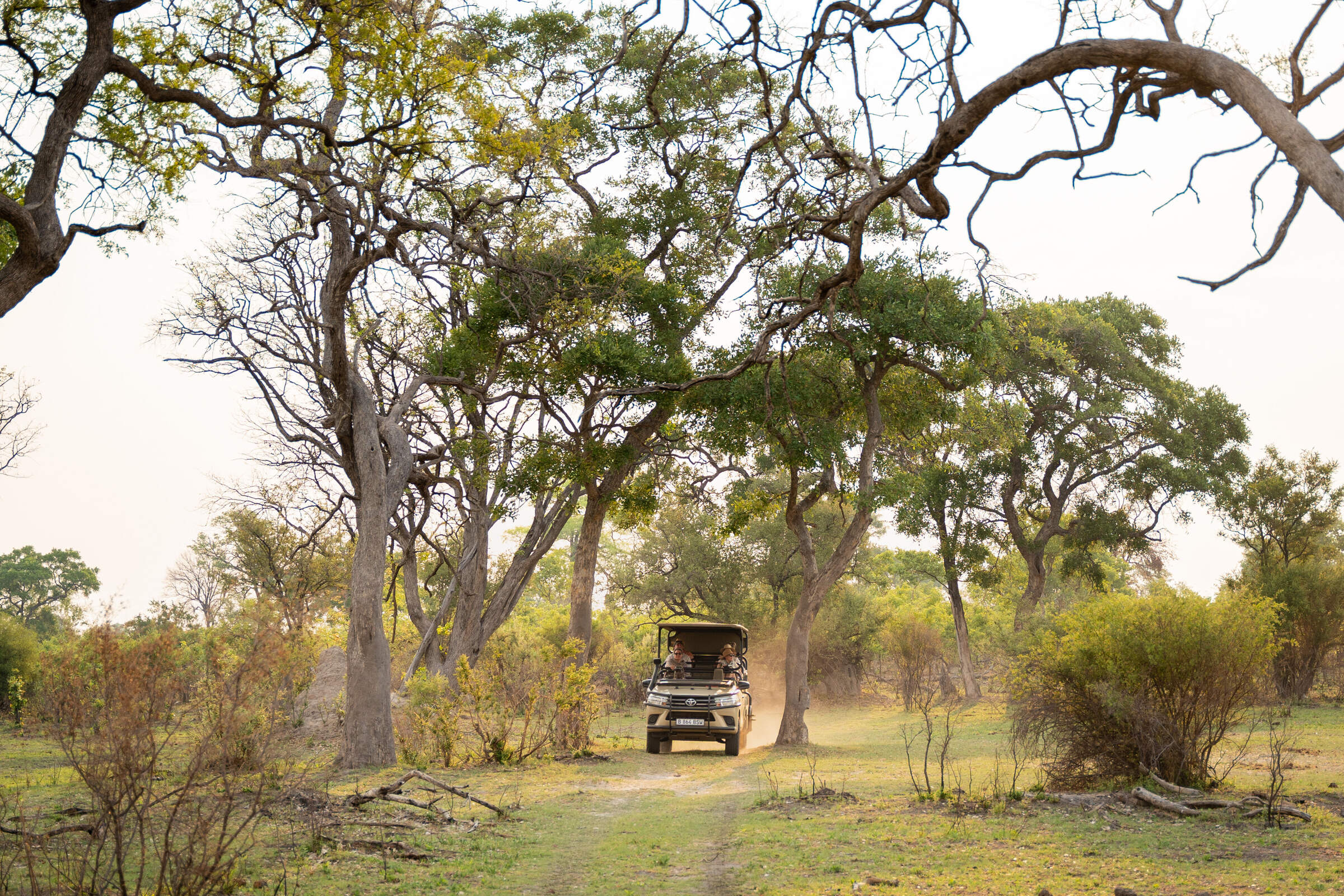
Karangoma
New for 2024, Karangoma is a classic, tented camp offering walking, canoeing and game drives, in partnership with the local Bukakwe San clan.
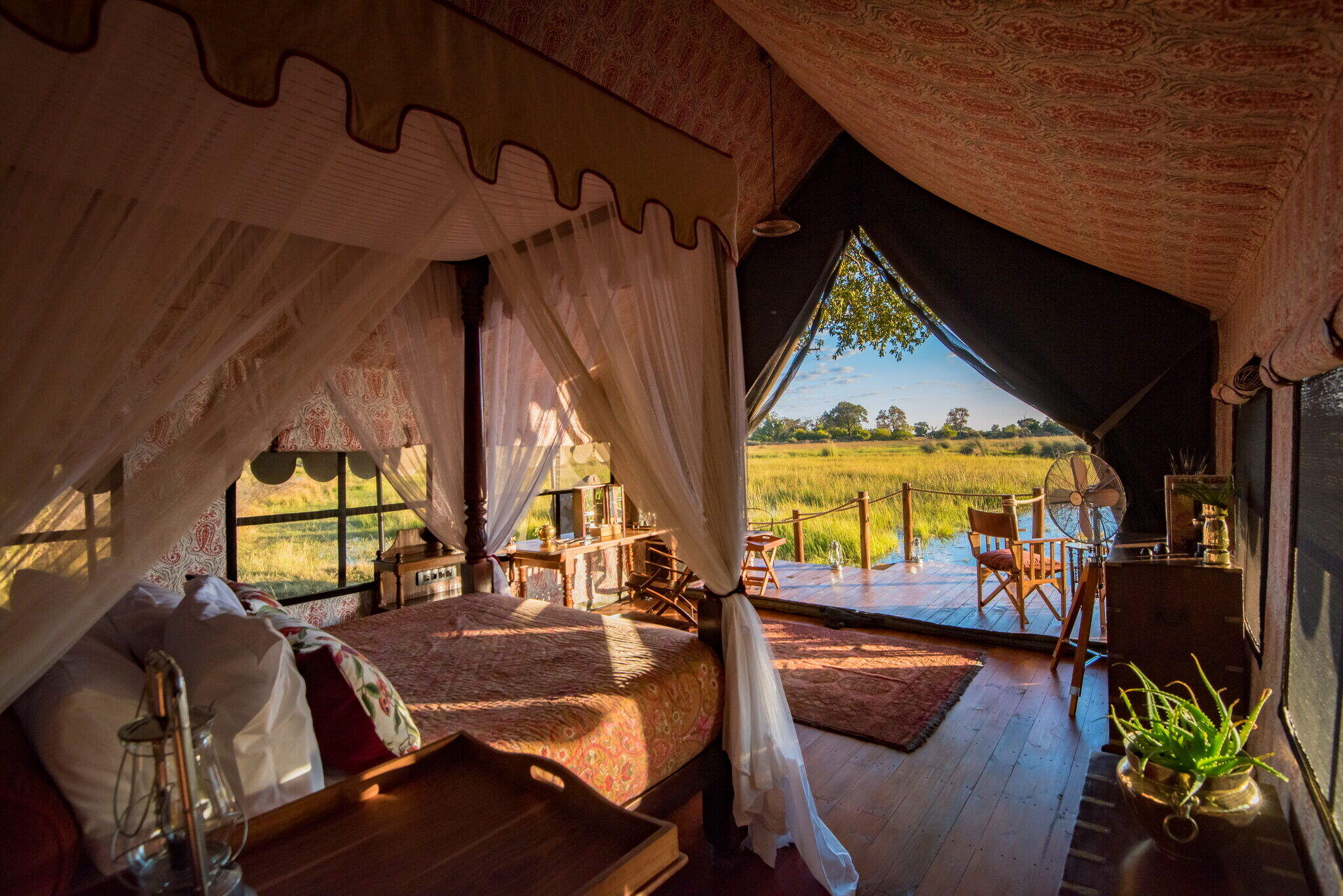
Duke’s Camp
On a remote island within a large concession, the romantic Duke's Camp and smaller Duke’s East are nestled among mature trees overlooking wildlife-rich plains and waterways of the Okavango.
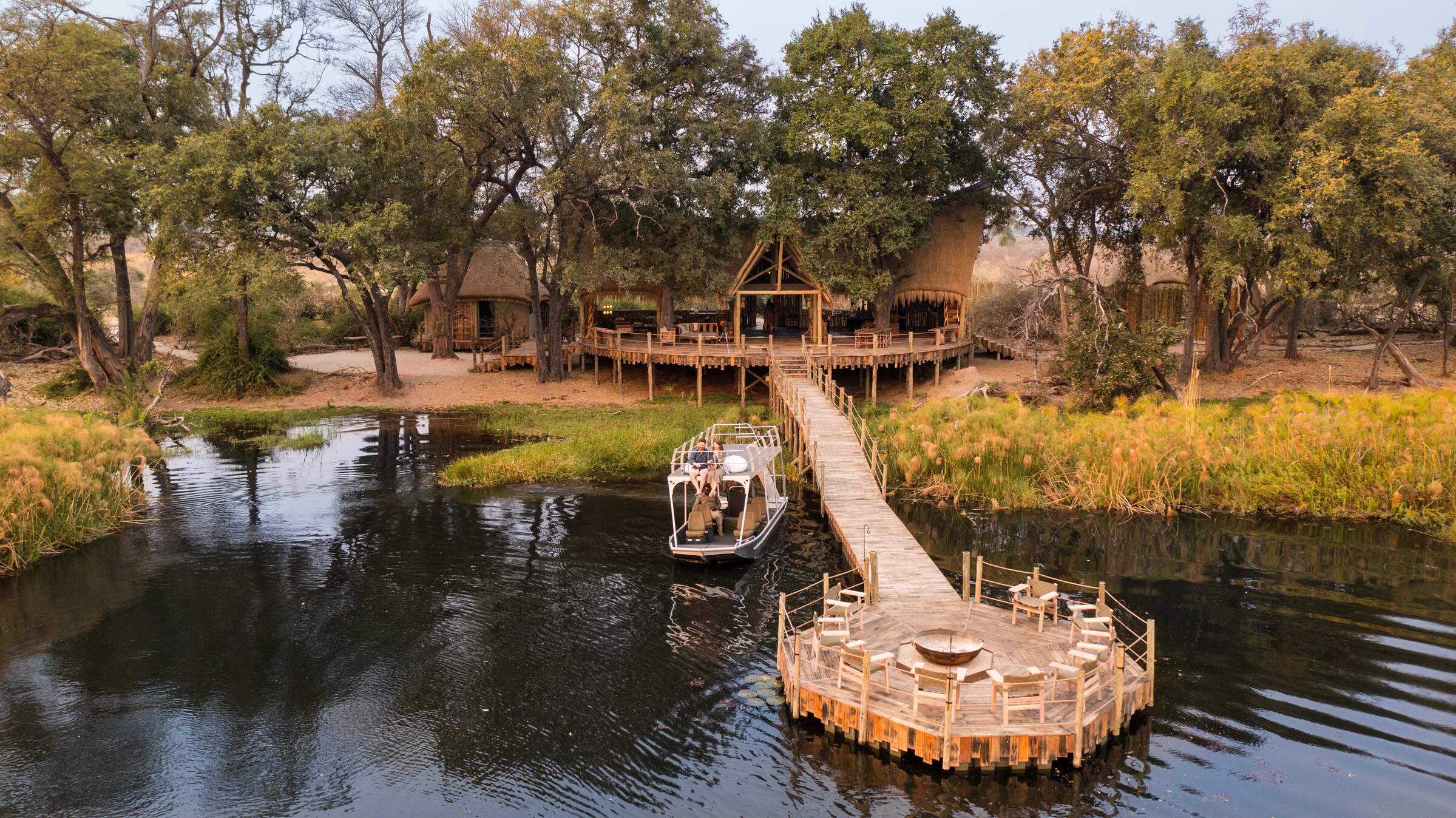
Sitatunga Island Camp
Tucked away in a pristine corner of the Okavango Delta, the exclusive Sitatunga Private Island is a water-based camp offering boating, mokoro trips and fishing.
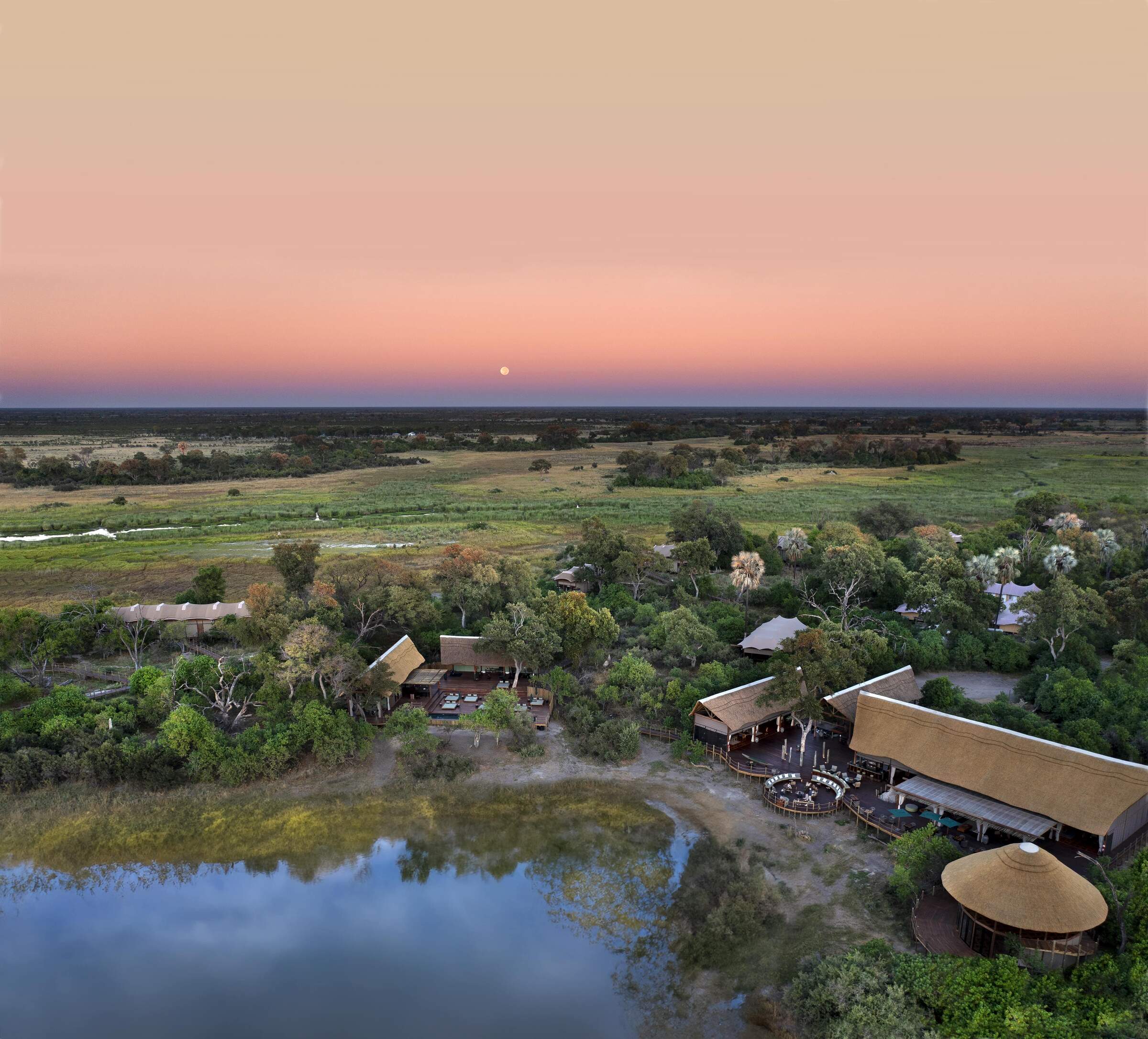
Atzaro Okavango
With a high level of tasteful luxury promised at Atzaro, we think it will be best suited to travellers seeking a touch of pampering alongside their safari.
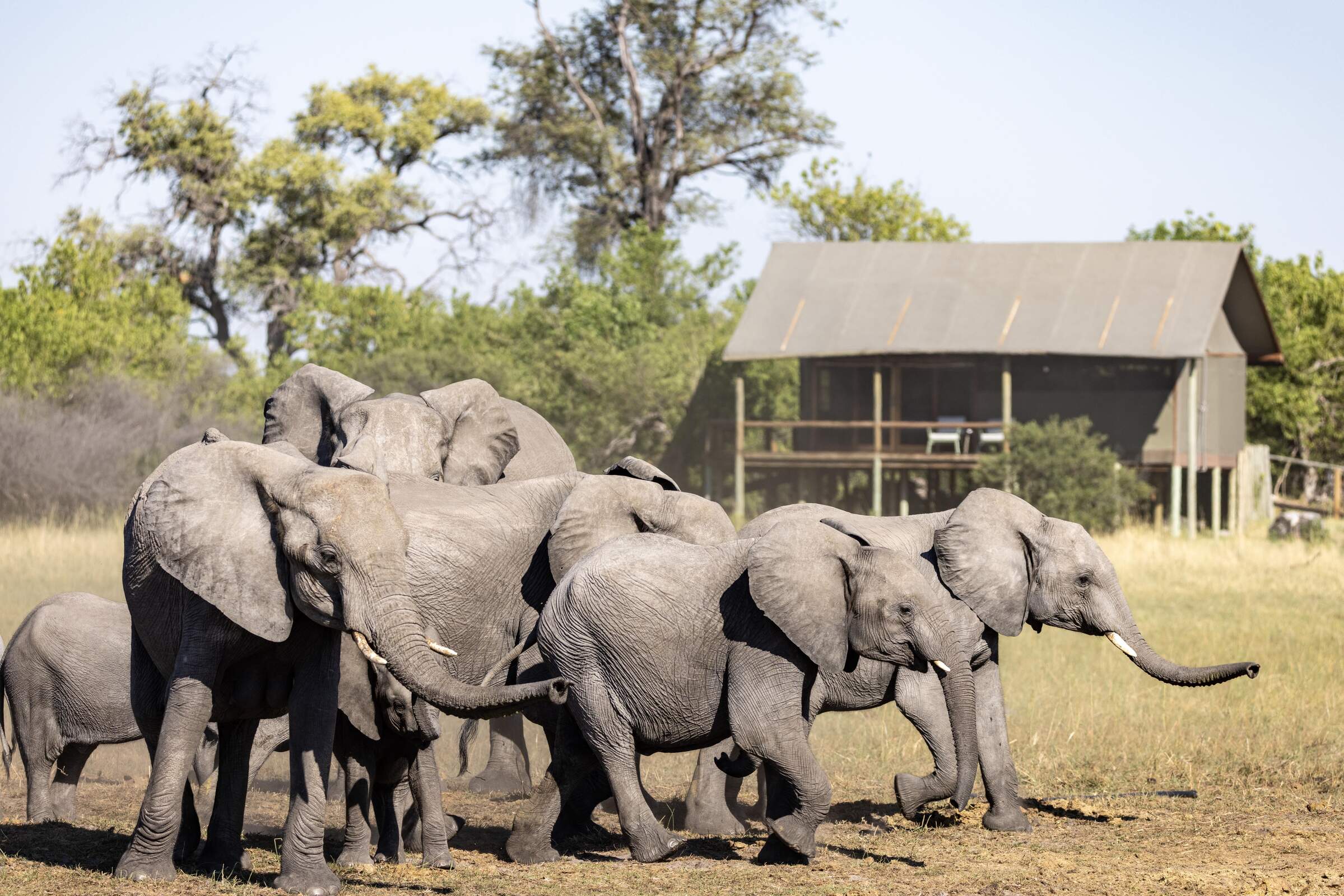
Mokolwane
Deep in the heart of the Okavango, the simple Mokolwane focuses on wildlife viewing in a large, untouched area.
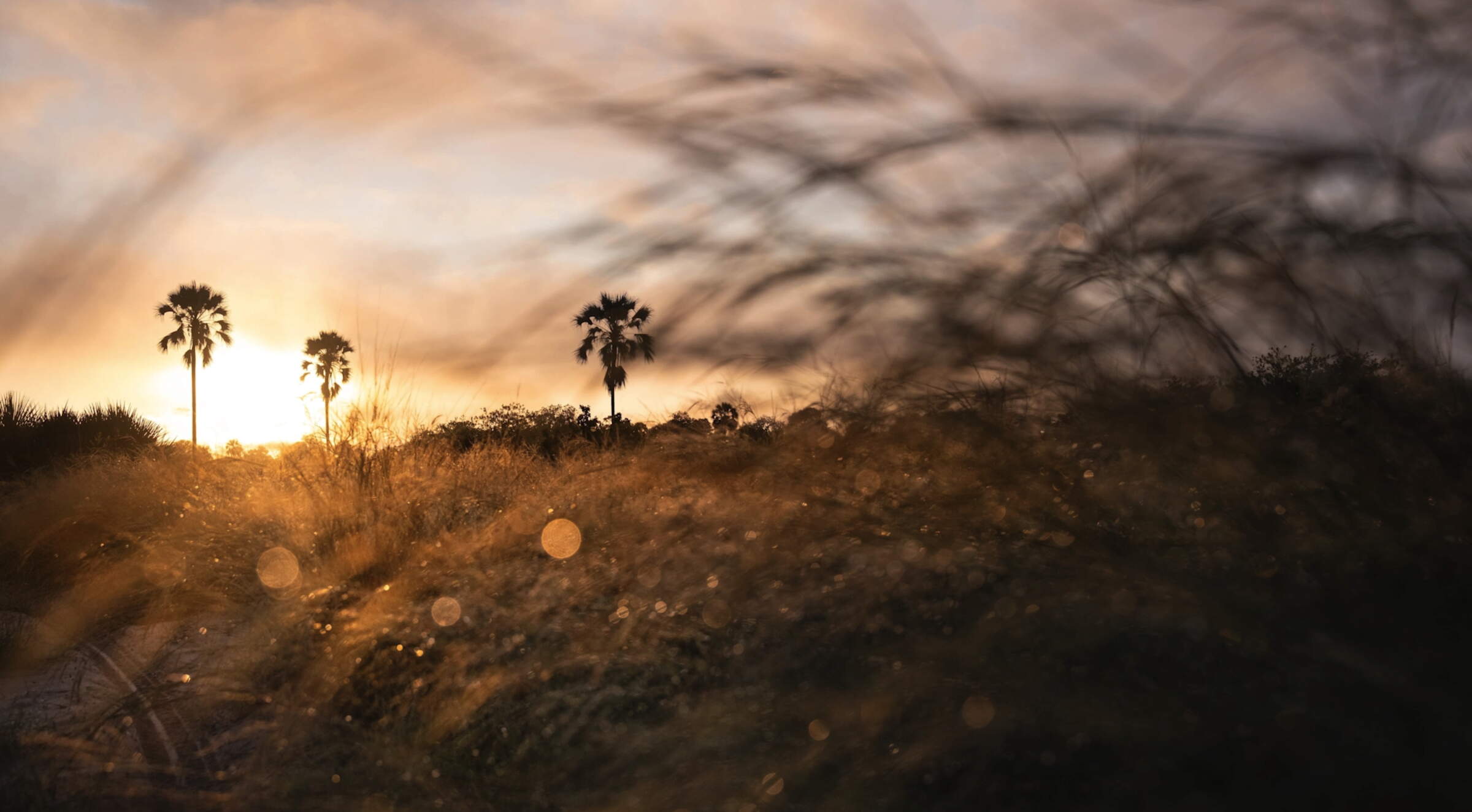
Singita Elela
Singita Elela is an exclusive safari camp on the western side of the Botswana's Okavango Delta - offering superb wildlife and water based opportunities depending on the seasonality.
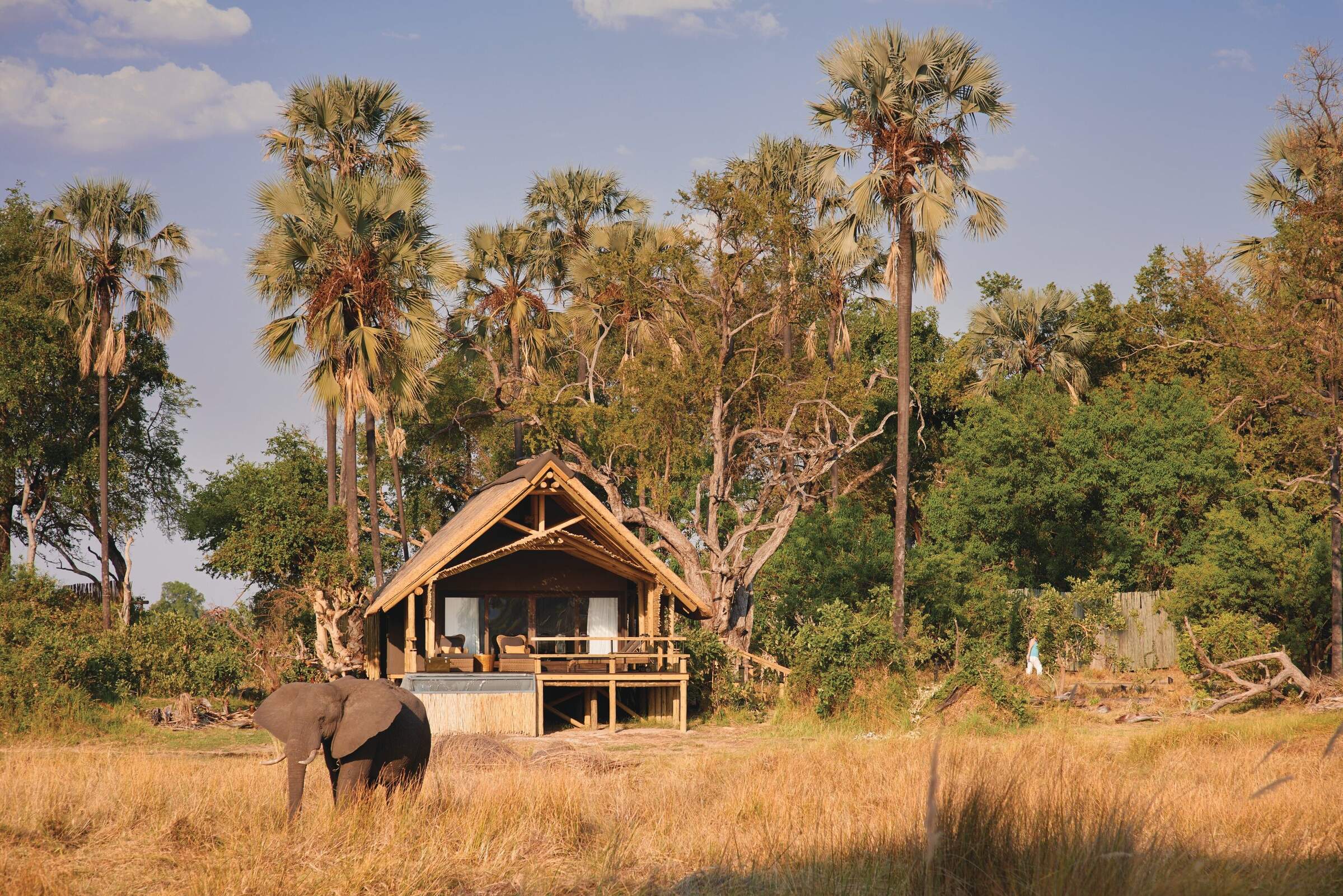
Eagle Island Lodge
Eagle Island Lodge is a luxurious camp with international-style facilities including air conditioning and intercom in each room; offering water based activities in the Okavango Delta.
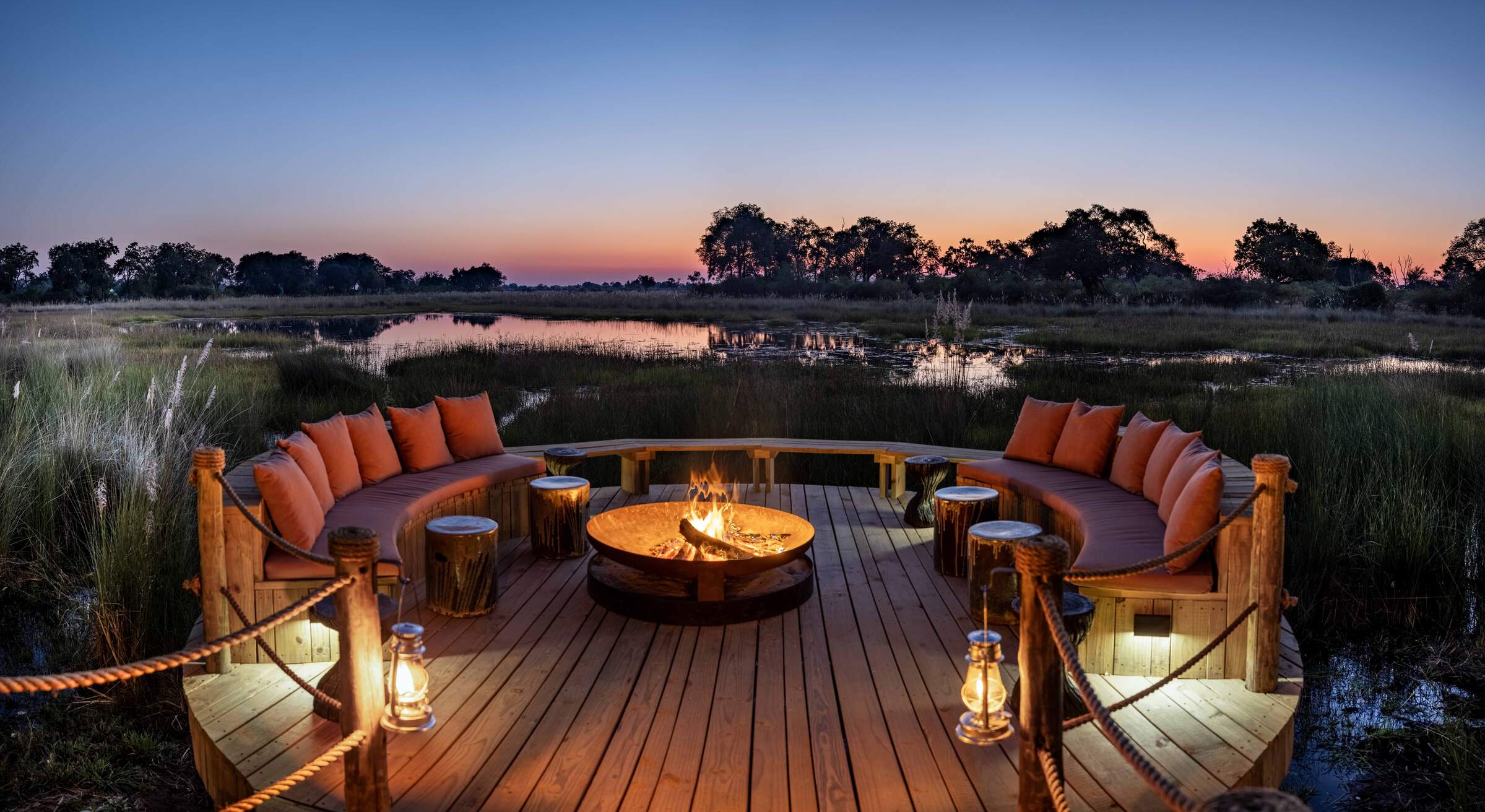
North Island Okavango
Deep in quintessentially “Okavango” territory, between deep-water and dry-land habitats, North Island focuses on a luxury safari experience with very good wildlife viewing opportunities.
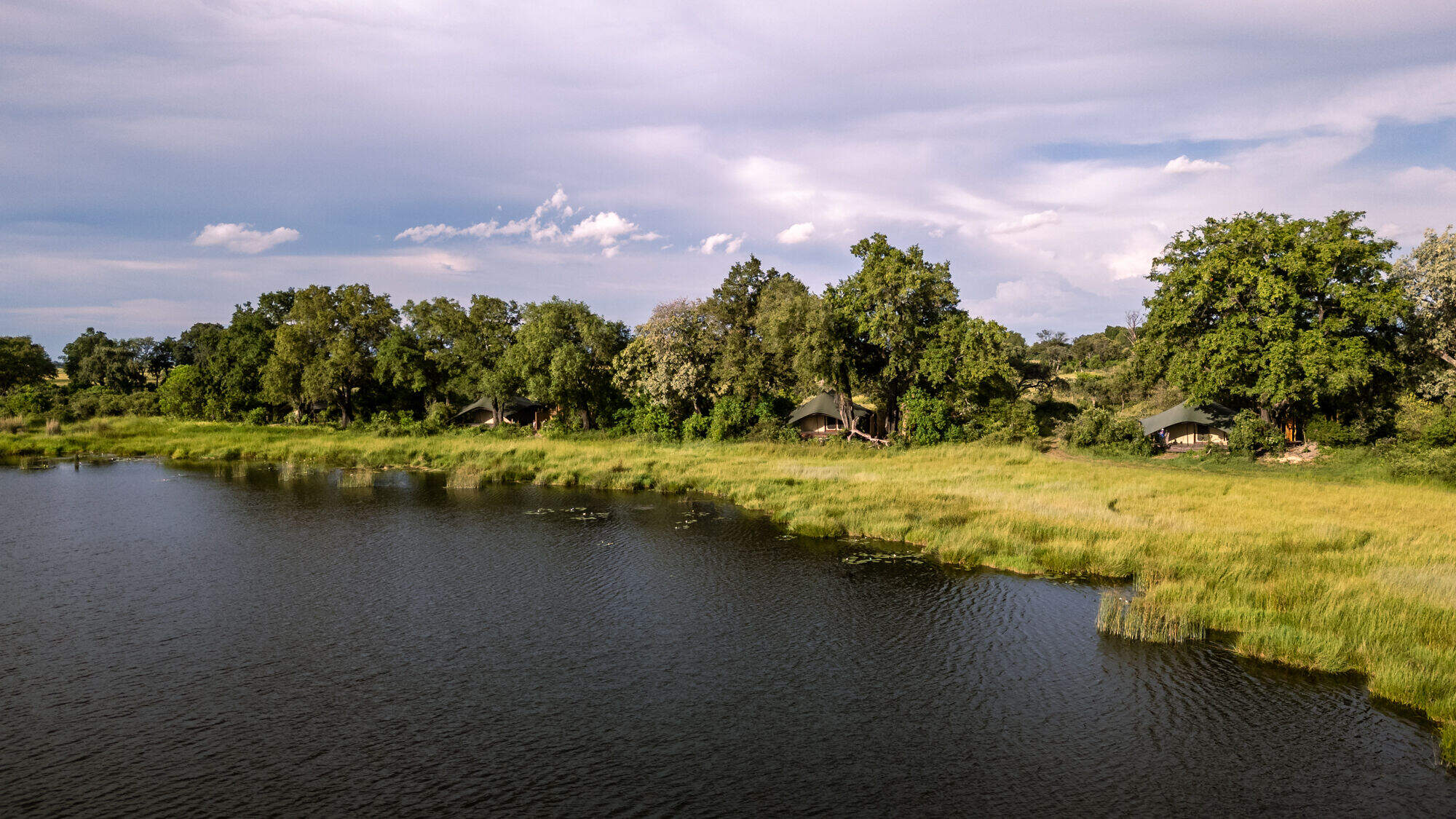
Maxa
Overlooking the permanent Maxa Lagoon, Maxa has a range of activities on offer, combining understated luxury with comfort in a remote location.
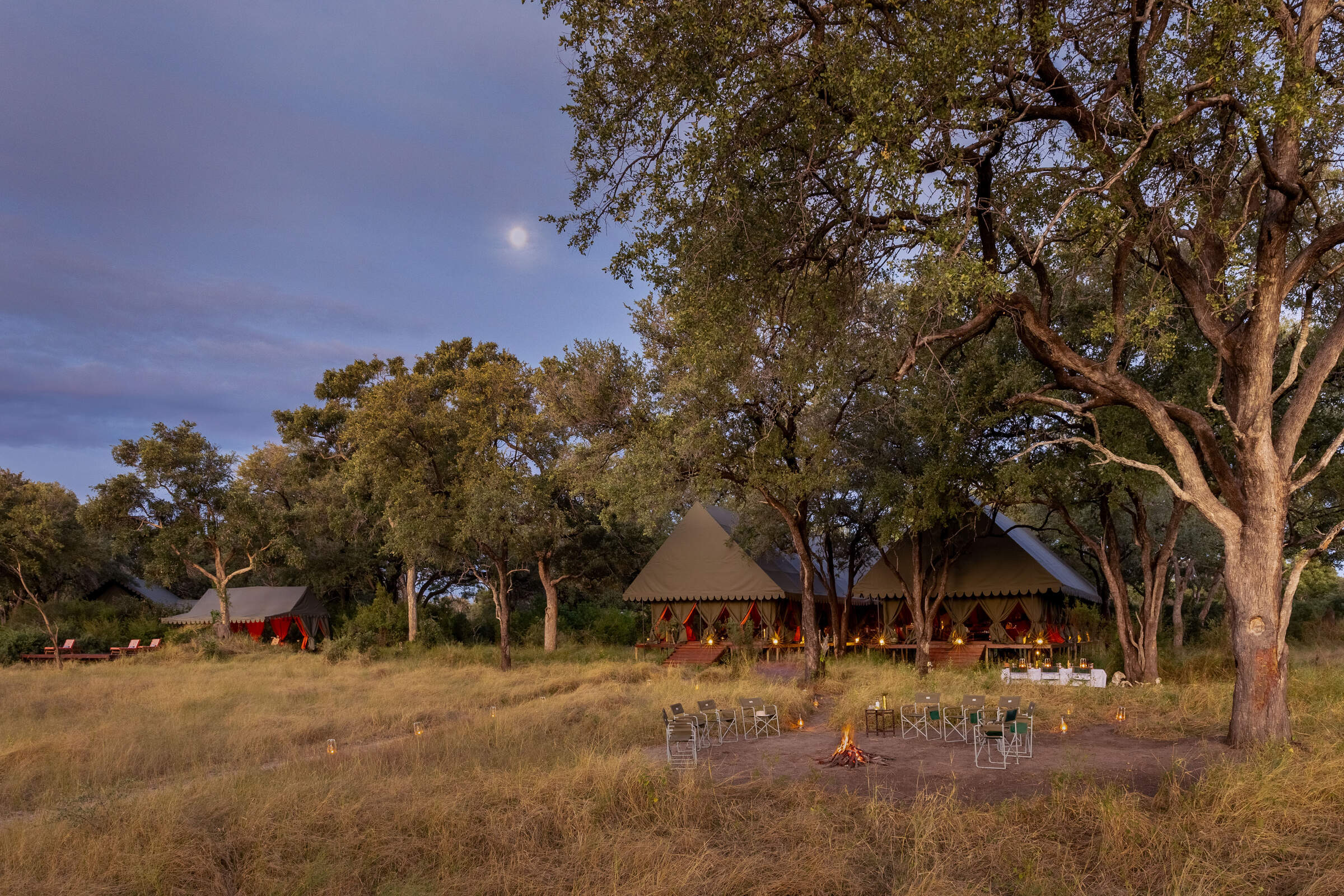
Mbamba
Deep within the northern Okavango, the classically styled Mbamba is located in the same wildlife-rich private concession as its sister camp Dukes.
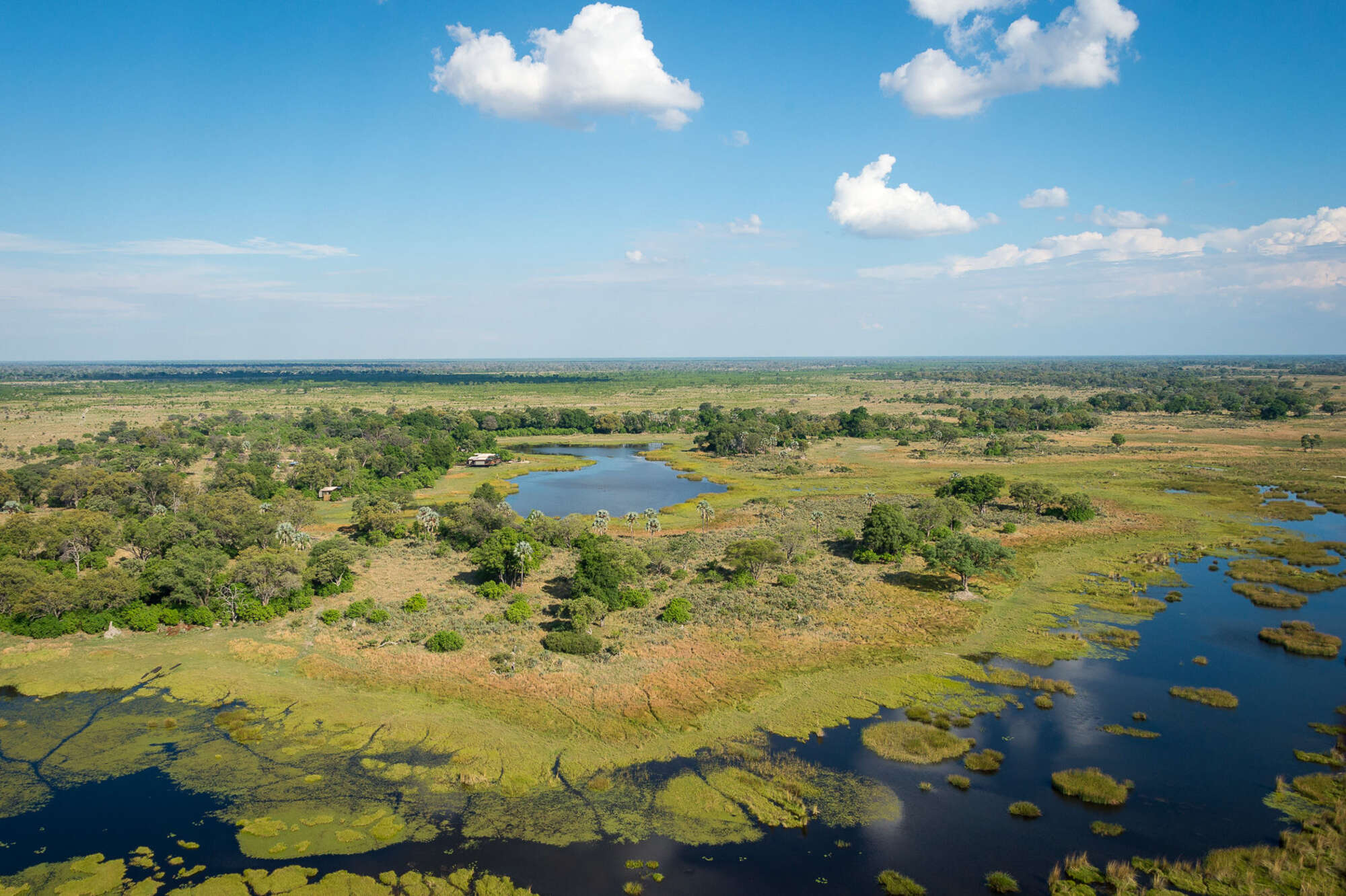
Qorokwe Camp
Luxurious and contemporary, the relatively new Qorokwe Camp is a gem in the Okavango Delta, offering land- and occasionally water-based activities in a prime wildlife area.
When to go to Okavango Delta Safari Reserves
Our month by month guide: What it's like to visit Okavango Walking Safari in Okavango Delta Safari Reserves
Jan
Feb
Mar
Apr
May
Jun
Jul
Aug
Sep
Oct
Nov
Dec
Okavango Delta Safari Reserves in January
January marks the peak of the rainy season in the Okavango Delta. Evening rains are often short but heavy, accompanied by occasional dramatic thunderstorms. Temperatures remain high, although cooler than the preceding months of October to December. Wildlife can be harder to spot as animals spread out across the lush floodplains.
This month is a birdwatcher’s paradise, with migratory species in abundance over flooded areas. Rising water levels in parts of the Delta make mokoro safaris possible, offering serene and immersive experiences. The vibrant greenery and dramatic skies provide stunning opportunities for photography. With relatively low rates and fewer visitors, January is ideal for those seeking a quieter, budget-conscious Botswana safari.
- Warm temperatures with frequent evening showers
- Birdlife at its most spectacular in the Delta
- Wildlife dispersed, but insects and smaller creatures abound
- Excellent availability in Delta lodges and camps
Our view
A good time to visit, with pros & cons
Weather in January
Okavango Delta Safari Reserves in February
February mirrors January’s weather patterns, with heavy rains and slightly cooler temperatures. The Delta’s landscape is at its greenest and teeming with life. Smaller animals, insects, and vibrant birdlife dominate, as many species raise their young. The rains create temporary pools and waterholes, further dispersing larger game, while thick vegetation and tall grass adds to the challenge of spotting big wildlife.
However, Moremi Game Reserve and select areas of the Delta still offer excellent game viewing opportunities. Rising water levels enhance water activities, with boat safaris providing unique access to the Delta’s watery beauty. February is particularly rewarding for photographers seeking lush landscapes and dramatic skies and birdwatchers, with many migratory species present.
- Warm with occasional thunderstorms
- Many animals with young in the Delta
- Big game dispersed throughout wetlands
- Big game dispersed, but viewing improves in drier areas
- Lower visitor numbers and great lodge availability
Our view
This is not a great time to visit
Weather in February
Okavango Delta Safari Reserves in March
March marks the gradual end of the main rainy season in the Okavango Delta. Sunny days become more frequent, with occasional afternoon thunderstorms. The Delta remains lush and vibrant, with wildlife activity increasing as animals finish raising their young and begin congregating around permanent water sources.
Rising water levels make boat safaris a highlight, offering intimate access to the Delta’s waterways. Birdwatching is excellent, with both resident and migratory species thriving. With fewer visitors, March offers a quieter, more personal safari experience.
- Rains taper off but temperatures remain warm
- Occasional small thunderstorms in Delta
- Wildlife begins congregating around water sources
- Ideal conditions for boat safaris
- Few tourists and attractive rates at camps
Our view
A good time to visit, with pros & cons
Weather in March
Okavango Delta Safari Reserves in April
April brings clearer skies to the Okavango Delta, with the landscape remaining green and lush. Night temperatures begin to drop, especially in the southern Delta. The annual floods from Angola start to flow through the northern Delta, filling channels and lagoons, creating ideal conditions for water-based activities like boat safaris.
Wildlife viewing improves as vegetation thins and predator activity increases with cooler evenings. Moremi Game Reserve and the private concessions offer rewarding game drives, and walking safaris on the larger islands, such as Chief’s Island, become popular during this time. Birdwatching remains excellent, with many migratory species still present. April’s combination of pleasant weather, wildlife activity, and relatively low rates makes it a rewarding time to visit.
- Cooler evenings and occasional light showers
- Floodwaters begin to fill Delta channels
- Predator-prey interactions increase
- Ideal for walking safaris and boat trips
- Popular shoulder season, rates fairly low
Our view
A good time to visit, with pros & cons
Weather in April
Okavango Delta Safari Reserves in May
May is a popular time to visit the Okavango Delta, marking the last month of the shoulder season. The annual floods continue to spread through the Delta, transforming the landscape. Cooler mornings and evenings encourage predator activity, while thinning vegetation makes wildlife spotting easier, though some tall grasses may still obstruct views.
May offers excellent photographic opportunities with clear, crisp air. It's a favourite time for many visitors, combining good wildlife sightings with pleasant weather. Camp bookings throughout the Delta fill up quickly during this period.
This is a perfect month for scenic flights, offering breathtaking views of the advancing floodwaters. Mokoro trips through the Delta’s tranquil waterways provide a unique perspective on the environment. Camps start to fill quickly as the Delta’s combination of pleasant weather and excellent wildlife sightings makes it a favourite among safari-goers.
- Cool mornings and evenings with little rain
- Improved game viewing as Delta grasses thin
- Predator activity increasing in drier areas
- Scenic flights and water activities highly recommended
- Last month of shoulder season for camps
Our view
A very good time to visit
Weather in May
Okavango Delta Safari Reserves in June
June signals the start of the dry season in the Okavango Delta. Days are warm, with clear skies, while mornings and evenings can be cold, occasionally reaching freezing temperatures. The annual floods reach their peak, creating spectacular conditions for water-based activities like boat safaris along the Khwai River and in private concessions.
Wildlife concentrates around permanent water sources as surface water dries up, improving game viewing. The thinning vegetation and crisp, clear air make June perfect for photography. High demand for camp bookings reflects its popularity, as this month combines great game viewing and pleasant weather.
- Warm days, cold mornings and nights
- Peak floodwaters make boat safaris unforgettable
- Wildlife congregates around permanent water sources
- Excellent conditions for photography
- High demand for camps and lodges
Our view
Fantastic: the very best time to visit
Weather in June
Okavango Delta Safari Reserves in July
July offers cool mornings and evenings with warm, sunny days, making it ideal for wildlife viewing. The floodwaters remain at their peak, providing excellent opportunities for boat safaris. Vegetation continues to thin, enhancing visibility on game drives in Moremi Game Reserve and the Okavango’s private reserves.
Large herds of elephants and buffalo are common sights as they gather near water sources. Predator sightings, including lions and leopards, increase as prey concentrates. Birdwatching is rewarding, and the crisp winter air creates stunning photographic conditions. July is one of the most popular months to visit, with many lodges fully booked well in advance.
- Comfortable days, cold mornings and nights
- Excellent game viewing and predator activity
- Moremi and Khwai areas become busy
- Private concessions offer exclusivity
- High season rates; advance bookings essential
Our view
Fantastic: the very best time to visit
Weather in July
Okavango Delta Safari Reserves in August
August remains a highly sought-after month for visiting the Okavango Delta. Nights are cool, while daytime temperatures rise gradually. Wildlife viewing is exceptional as animals concentrate near water sources, while the Delta’s floods are typically at their peak, offering picturesque settings for excellent boat safaris.
Walking safaris and game drives in areas like Moremi Game Reserve and Chief’s Island are particularly rewarding. Large herds of elephants and buffalo are common sights, and predator activity is high, with increased chances of seeing lions, leopards, and wild dogs hunting. The clear skies and lack of humidity create excellent stargazing conditions. With many travellers visiting during European and North American holidays, lodge availability can be challenging.
- Dry, warm days and cool nights in the Delta
- Fantastic wildlife viewing near water sources
- Excellent opportunities for game drives and boat safaris
- Cloudless skies, spectacular stargazing
- High demand for accommodation – book early
Our view
Fantastic: the very best time to visit
Weather in August
Okavango Delta Safari Reserves in September
September is a favourite for many safari-goers in the Okavango Delta. Daytime temperatures rise, but nights remain cool. The landscape transforms as greenery fades, and hazy conditions create dramatic sunsets. Wildlife viewing peaks as animals cluster around permanent water sources, with especially large numbers of elephants and buffalo. This concentration of prey attracts predators, increasing chances of witnessing exciting hunts.
The return of migratory birds enhances birdwatching. Water levels begin to recede, but boat cruises are still possible. Dusty conditions may challenge photographers, but the stunning landscapes and wildlife action more than make up for it.
- Warm days, cool nights in the Delta
- Prime month for Okavango wildlife viewing
- Migratory birds return, enriching birdwatching
- Spectacular sunsets and dramatic scenery
- High season rates, many Delta camps full
Our view
Fantastic: the very best time to visit
Weather in September
Okavango Delta Safari Reserves in October
October is the hottest and driest month in the Okavango Delta. Wildlife concentrates around the last remaining water sources, creating some of the most dramatic game viewing opportunities of the year. Predator-prey interactions are frequent and visibility is excellent, making for thrilling safaris.
Walking safaris are particularly rewarding, especially on smaller islands, but early starts are essential to avoid the midday heat. Towards the end of the month, the first rains may bring relief and begin rejuvenating the parched landscape. Despite the heat, October offers excellent big-game viewing and dramatic photographic moments of animal interactions.
- Hot days, with late-month chances of rain
- Outstanding big-game viewing near water sources
- Water activities limited as floods recede
- Walking safaris provide unique experiences
- Final month of the peak safari season
Our view
Fantastic: the very best time to visit
Weather in October
Okavango Delta Safari Reserves in November
November marks the start of the green season in the Delta. Rising humidity and temperatures often lead to the first heavy rains; these are typically short, heavy showers in the late afternoon or night, creating spectacular scenes and bringing a flush of green to the parched landscape. Wildlife begins to disperse as waterholes refill, but game drives still offer rewarding sightings.
Water levels may be low, limiting boat activities, but November is exceptional for birdwatching, with the arrival of many migratory species. Scenic flights highlight the contrast between dry and wet areas. The first two weeks are popular for travellers seeking good game viewing at lower rates as the Delta transitions into its shoulder season.
- Hot, humid days in the Delta
- Dramatic rain showers , increasing as month progresses
- Migratory birds arrive in abundance
- Wildlife watching good, but less predictable
- Shoulder season offers mid-range rates
Our view
A good time to visit, with pros & cons
Weather in November
Okavango Delta Safari Reserves in December
December sees the rainy season in full swing across the Okavango Delta, bringing some respite from high temperatures. Game viewing becomes more challenging as wildlife disperses, but great sightings can still be had. The landscape transforms dramatically, with lush vegetation sprouting across the Delta. This period is excellent for birdwatching, with numerous migratory species present.
Water levels begin to rise, gradually improving conditions for boat safaris. The green season offers unique photographic opportunities, with dramatic skies and newborn animals. December is ideal for visitors seeking a more intimate Delta experience, with fewer tourists and lower rates at many camps and lodges. The combination of wildlife, birdlife, and scenic beauty makes it a rewarding time to visit.
- Warm temperatures
- High chance of rain in short, heavy storms
- Wildlife more dispersed across Delta
- Game viewing more challenging in wetlands
- Low-season rates and fewer visitors in most Delta camps
Our view
A good time to visit, with pros & cons
Weather in December

Looking for inspiration on where to travel next?
Visit our trip chooser to explore your options and find inspiration for your perfect African adventure
Inspire me